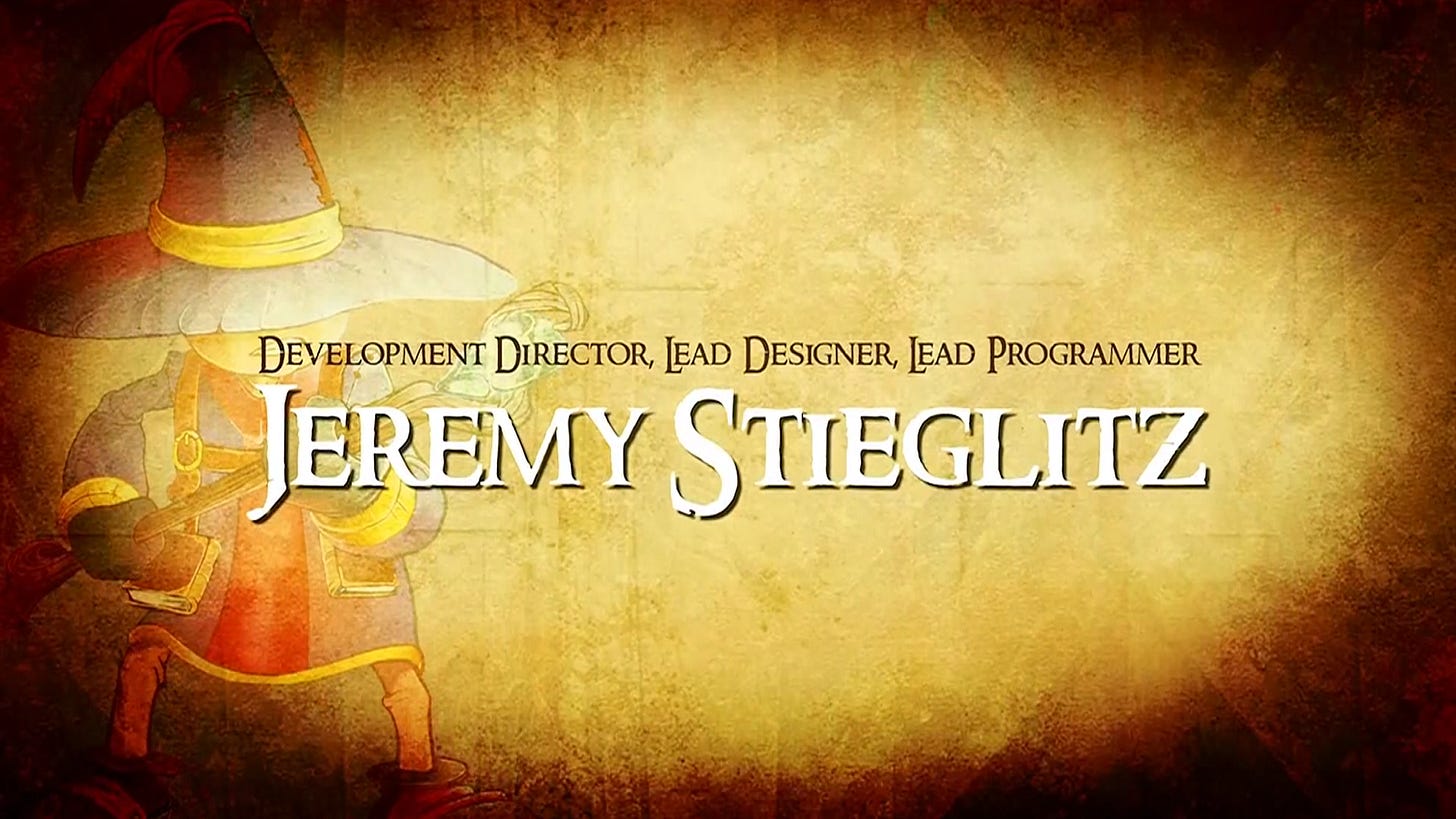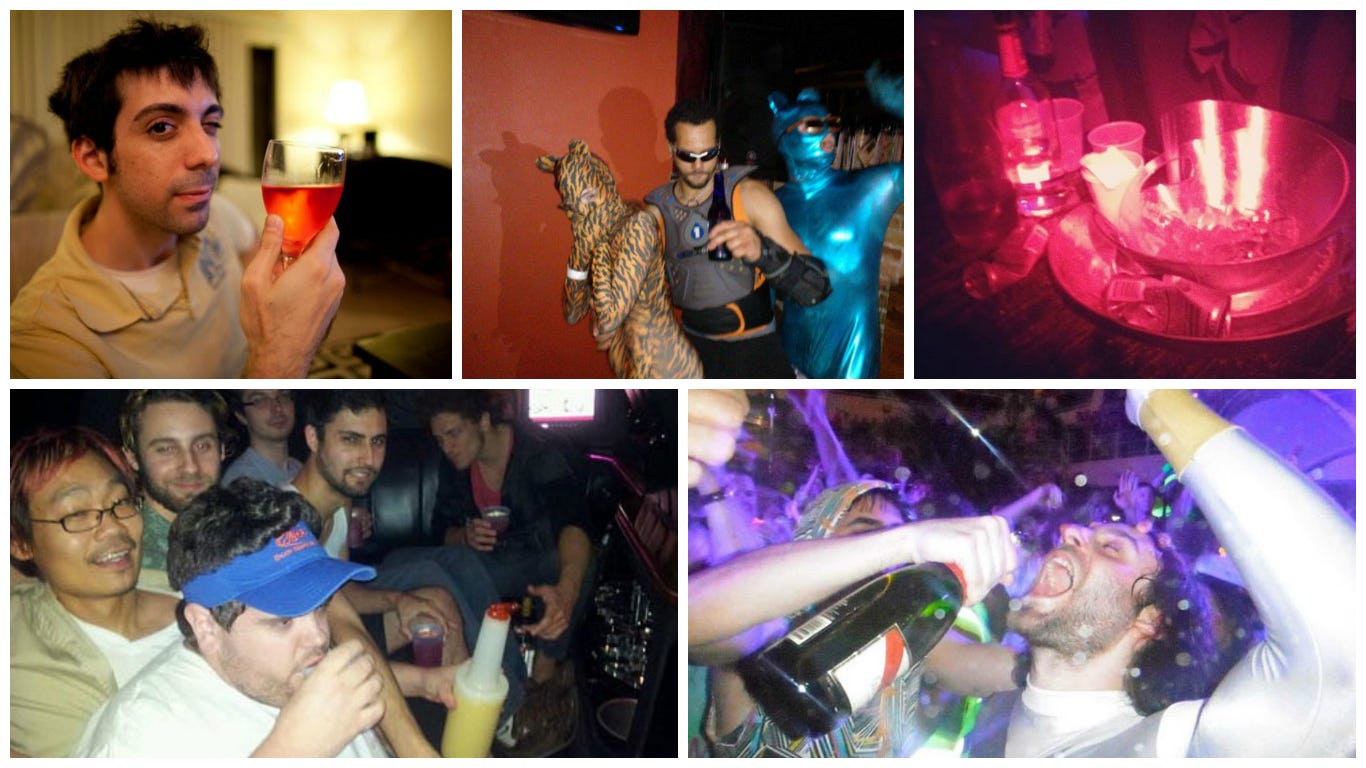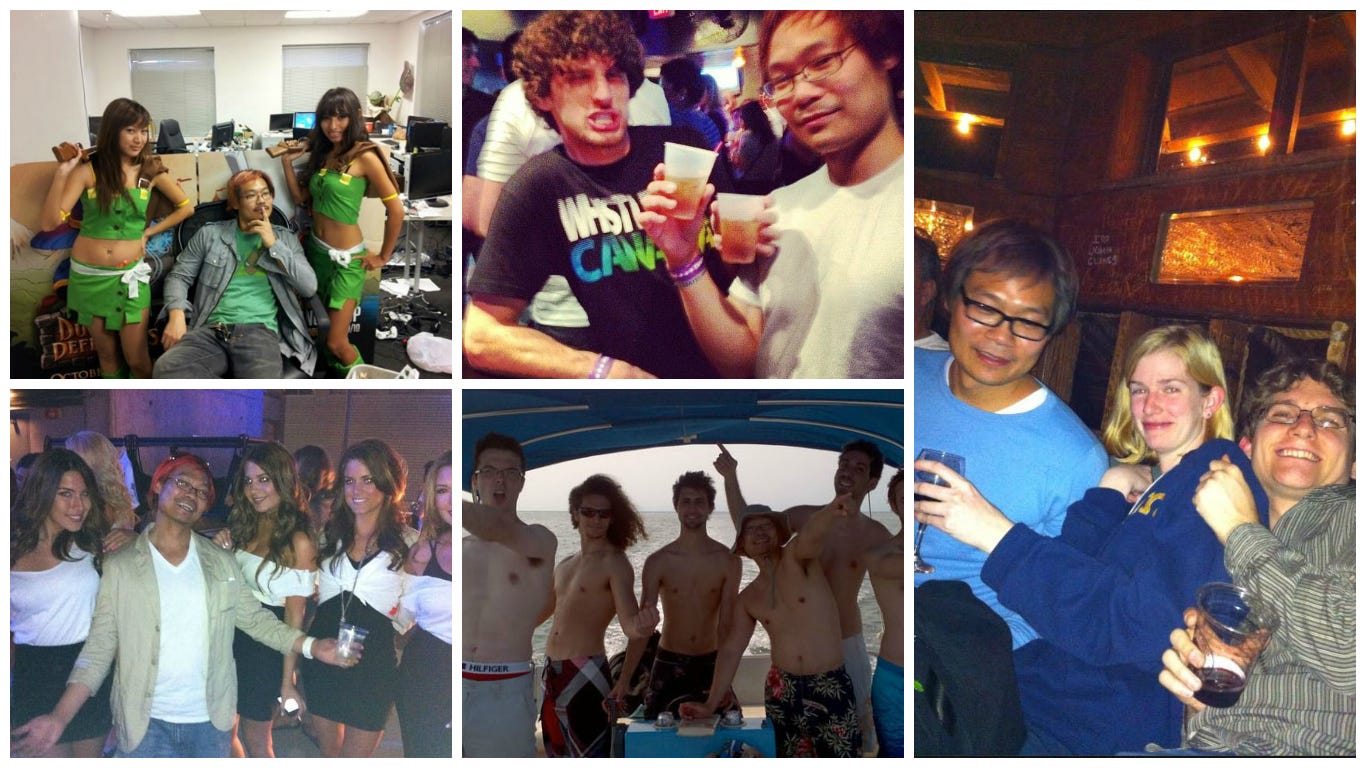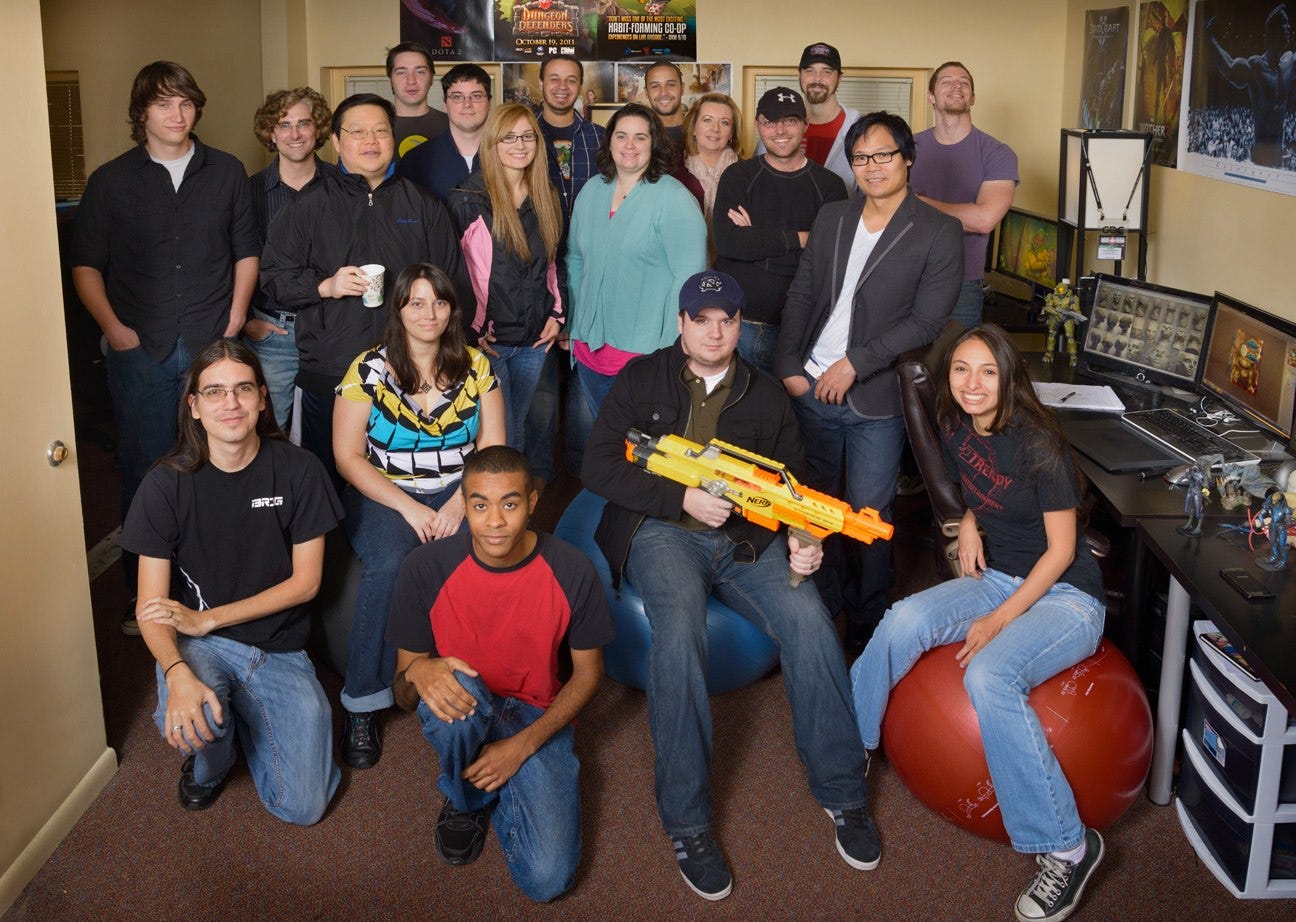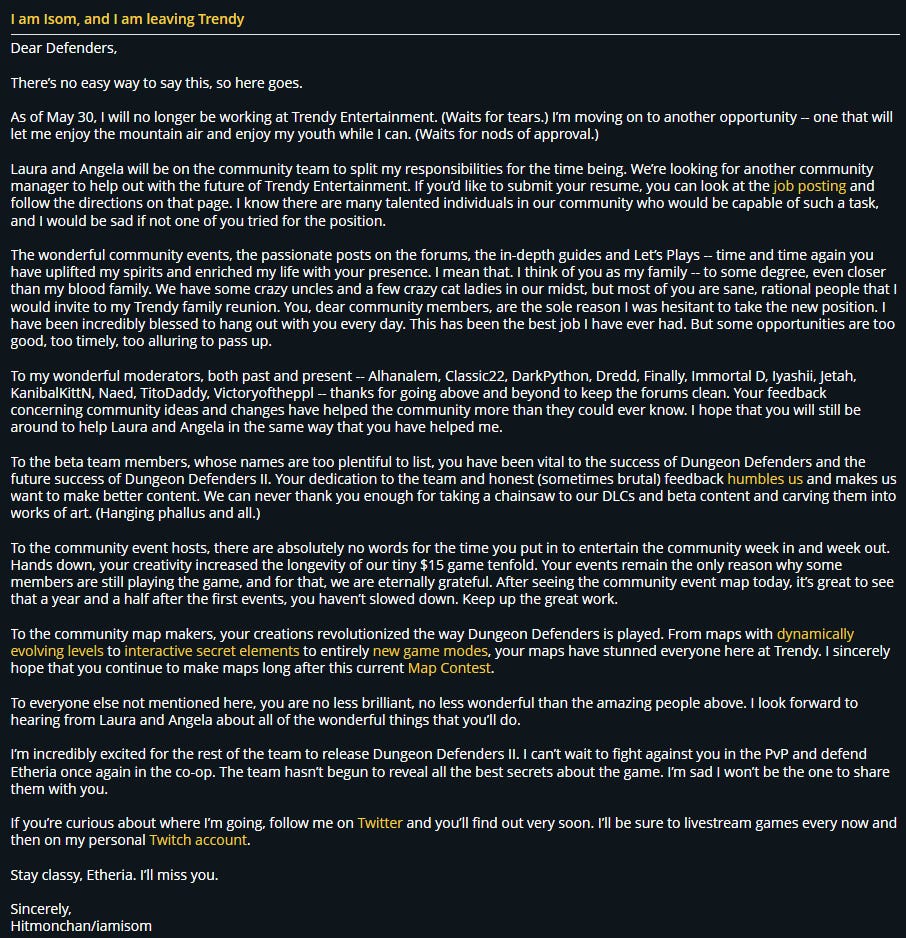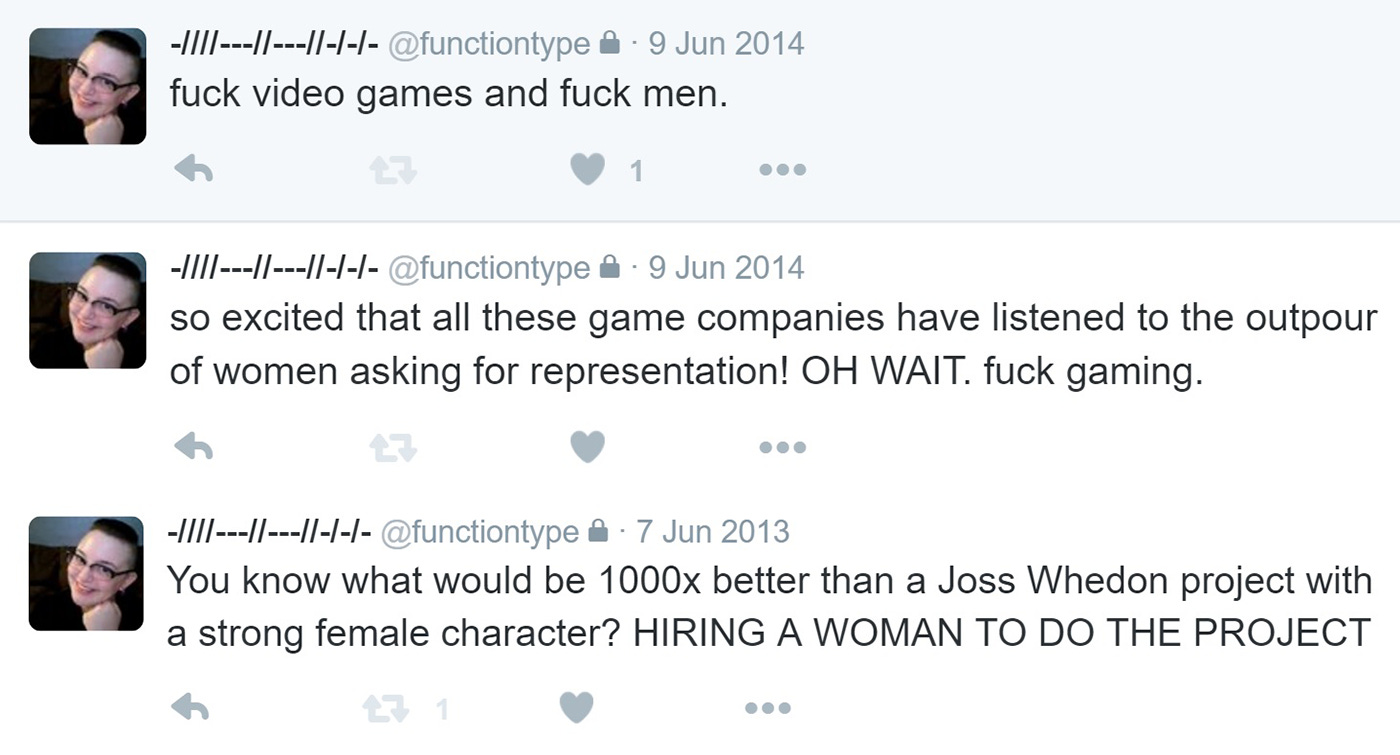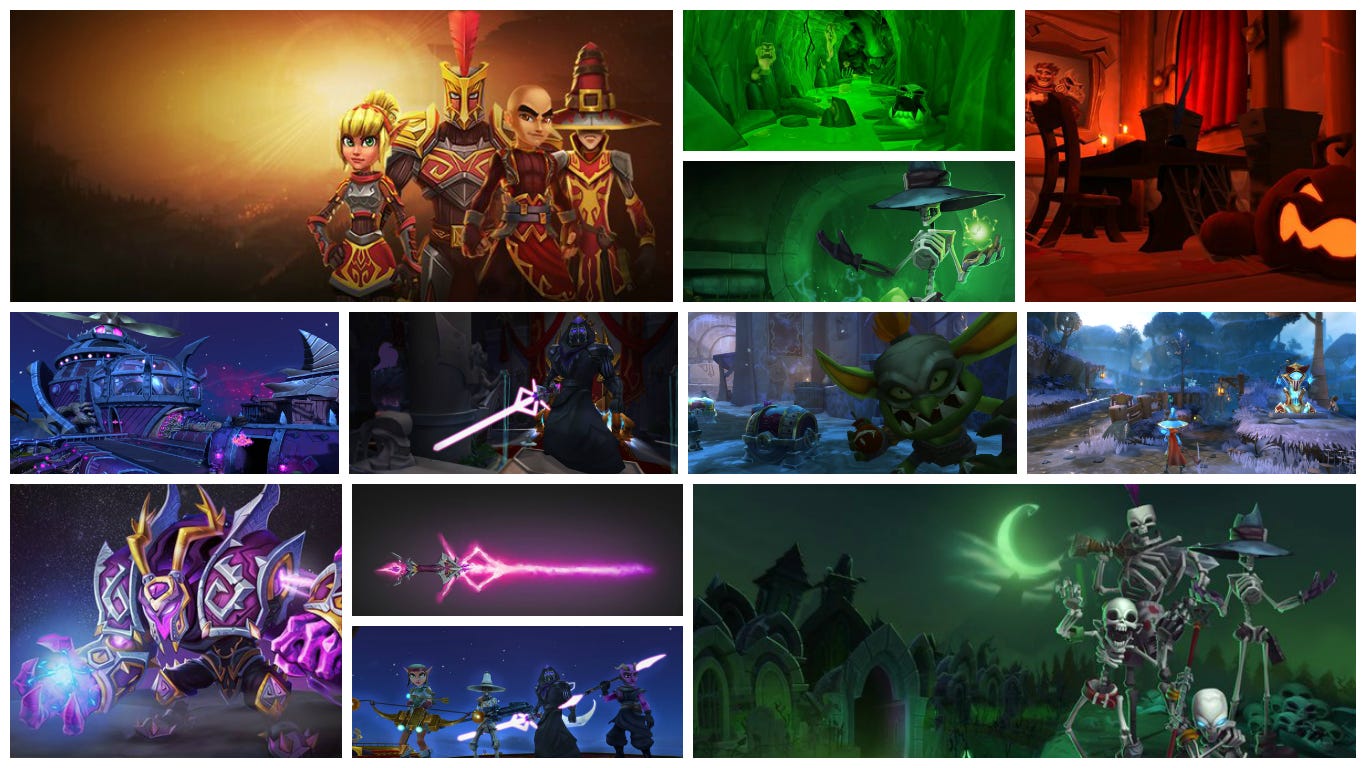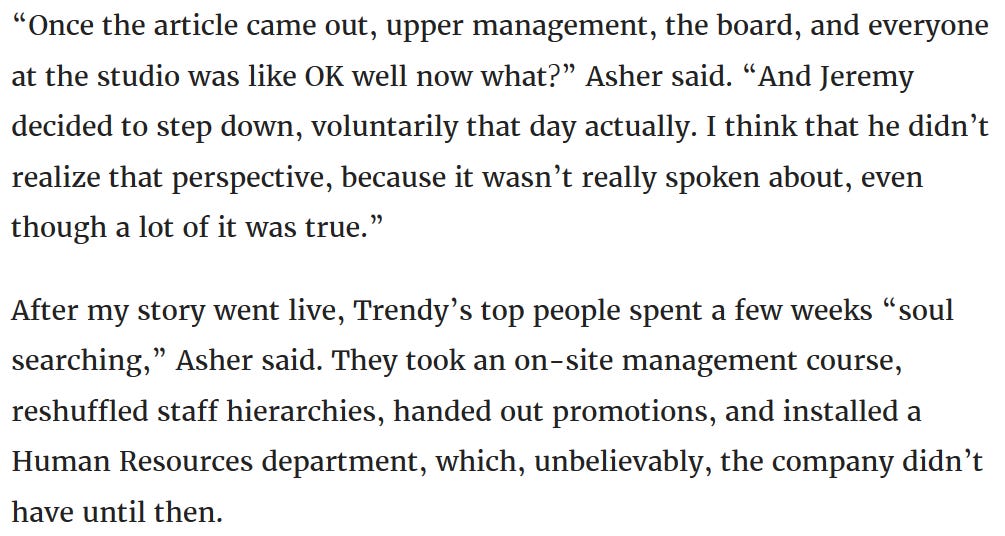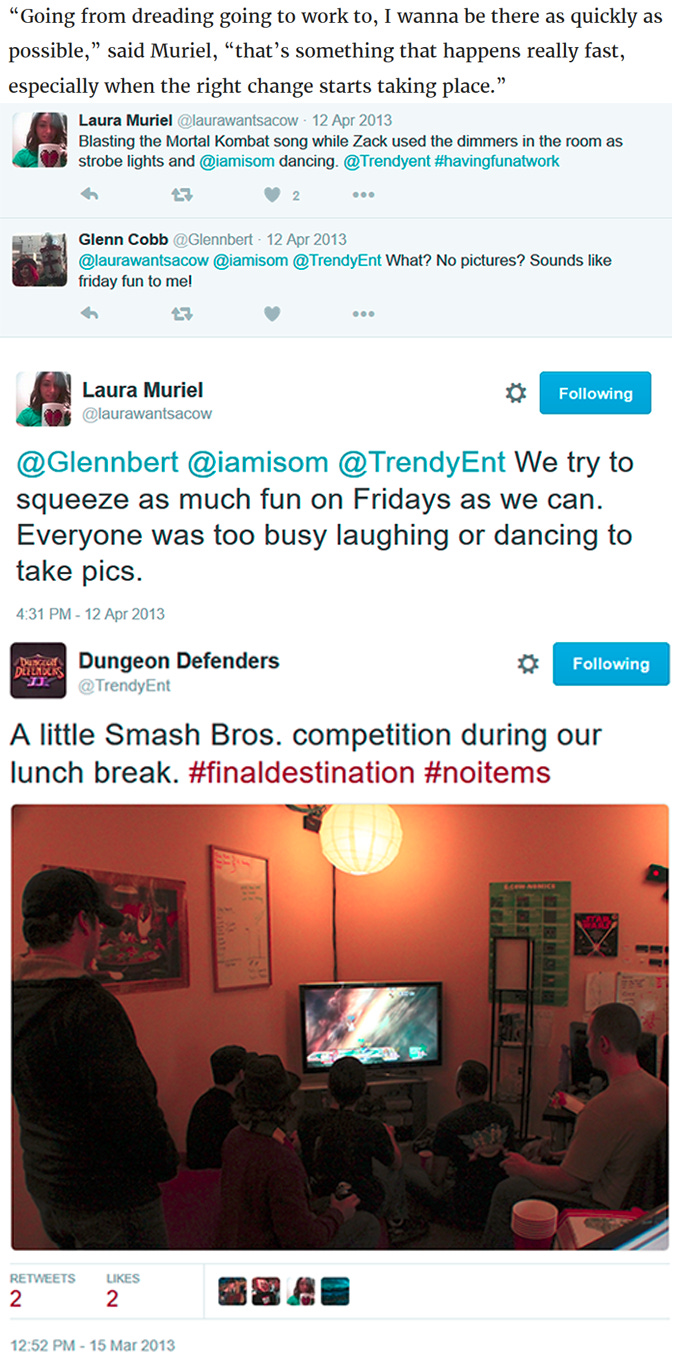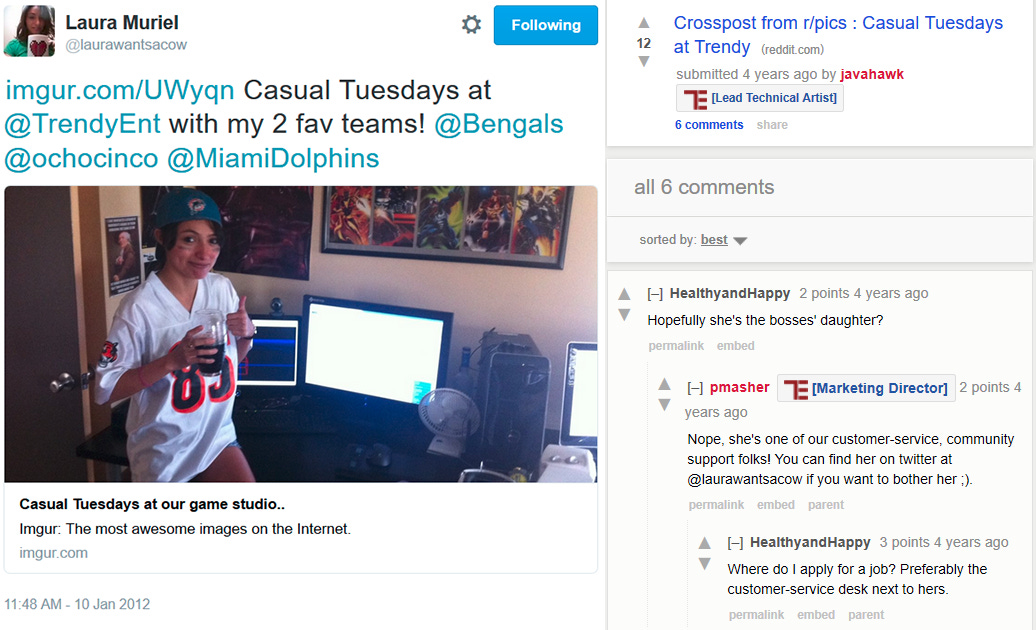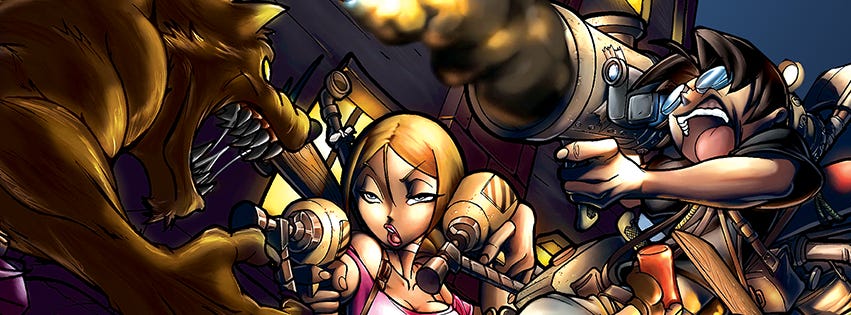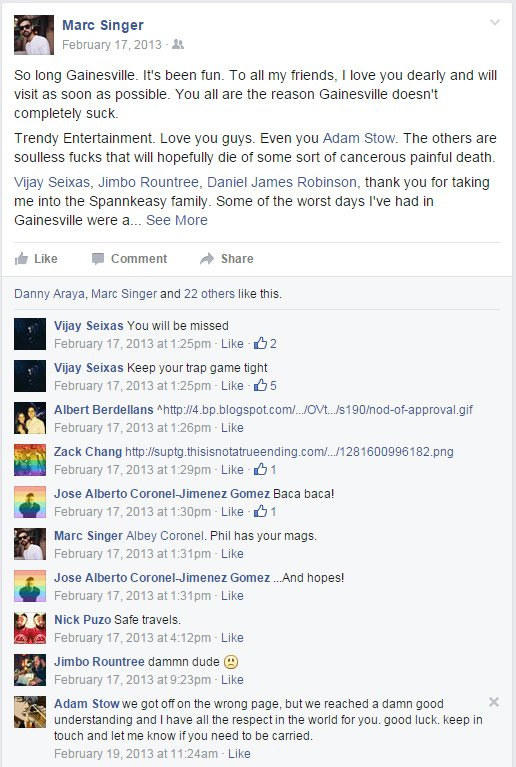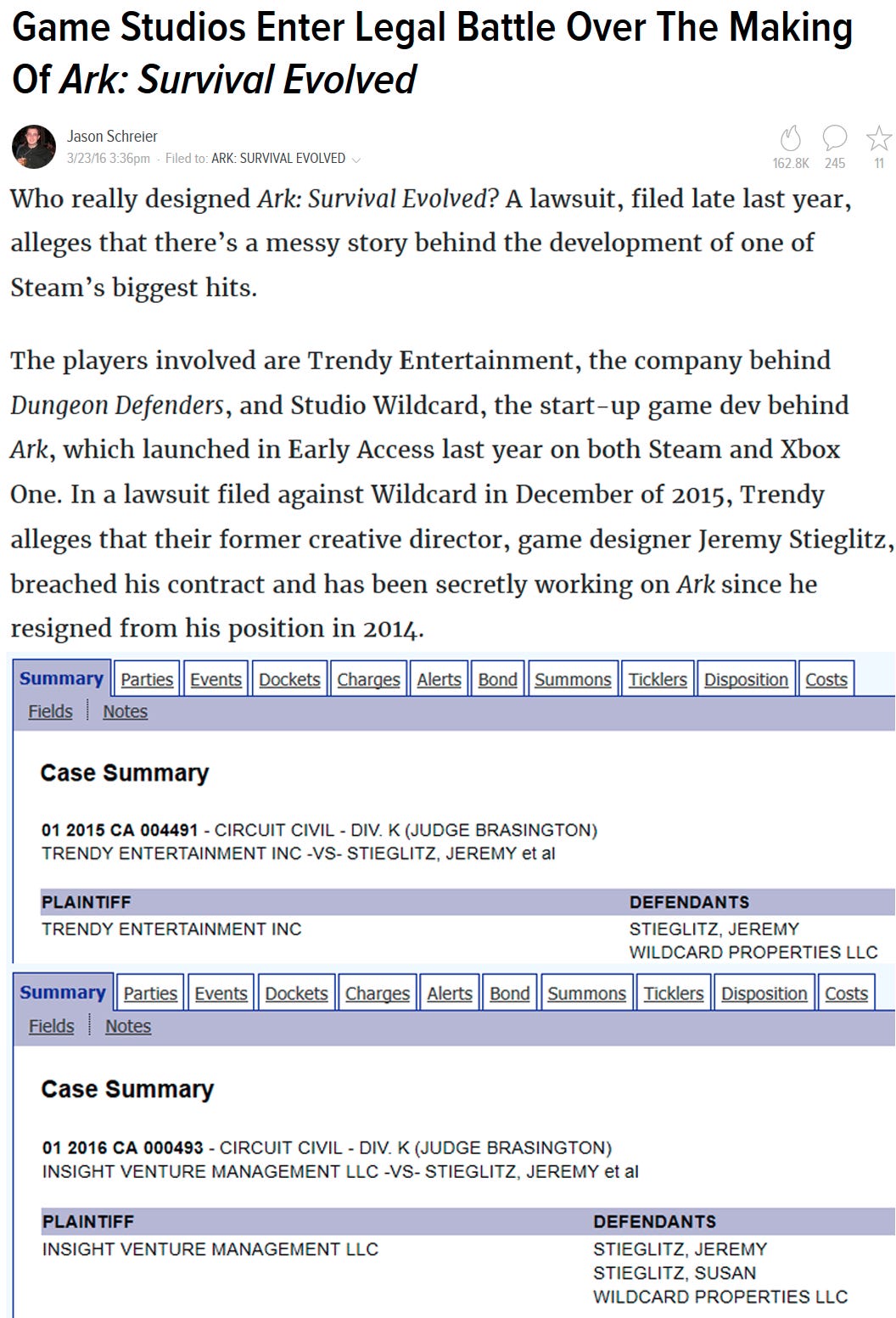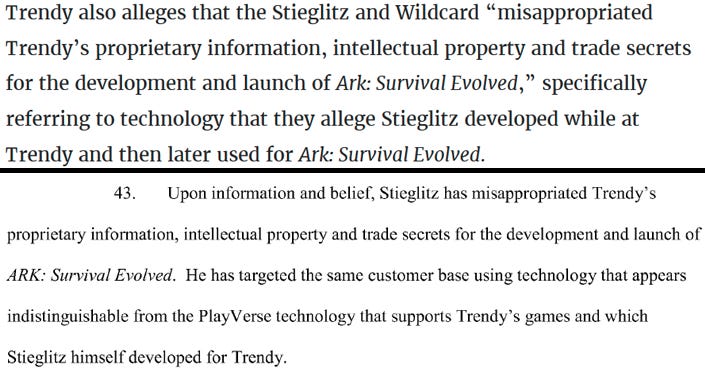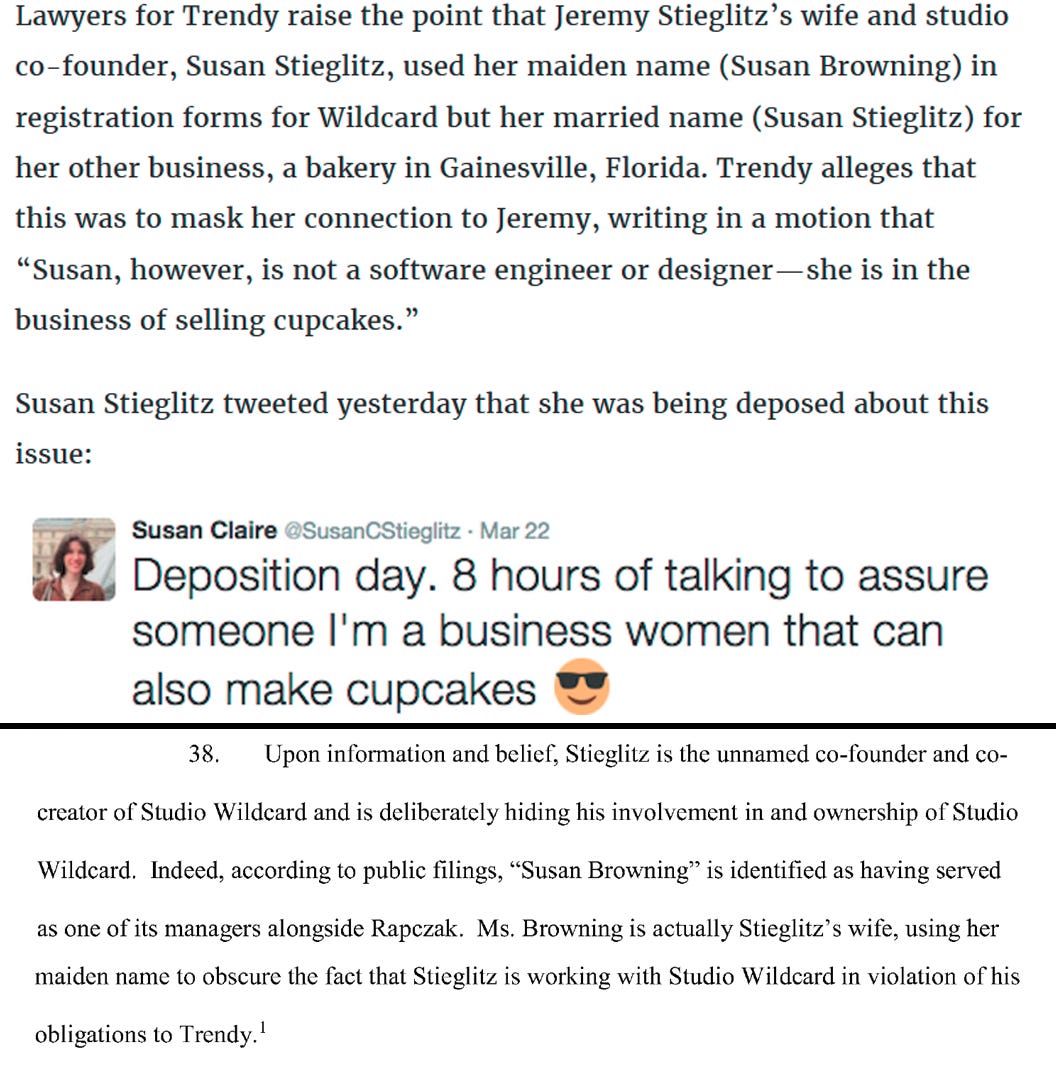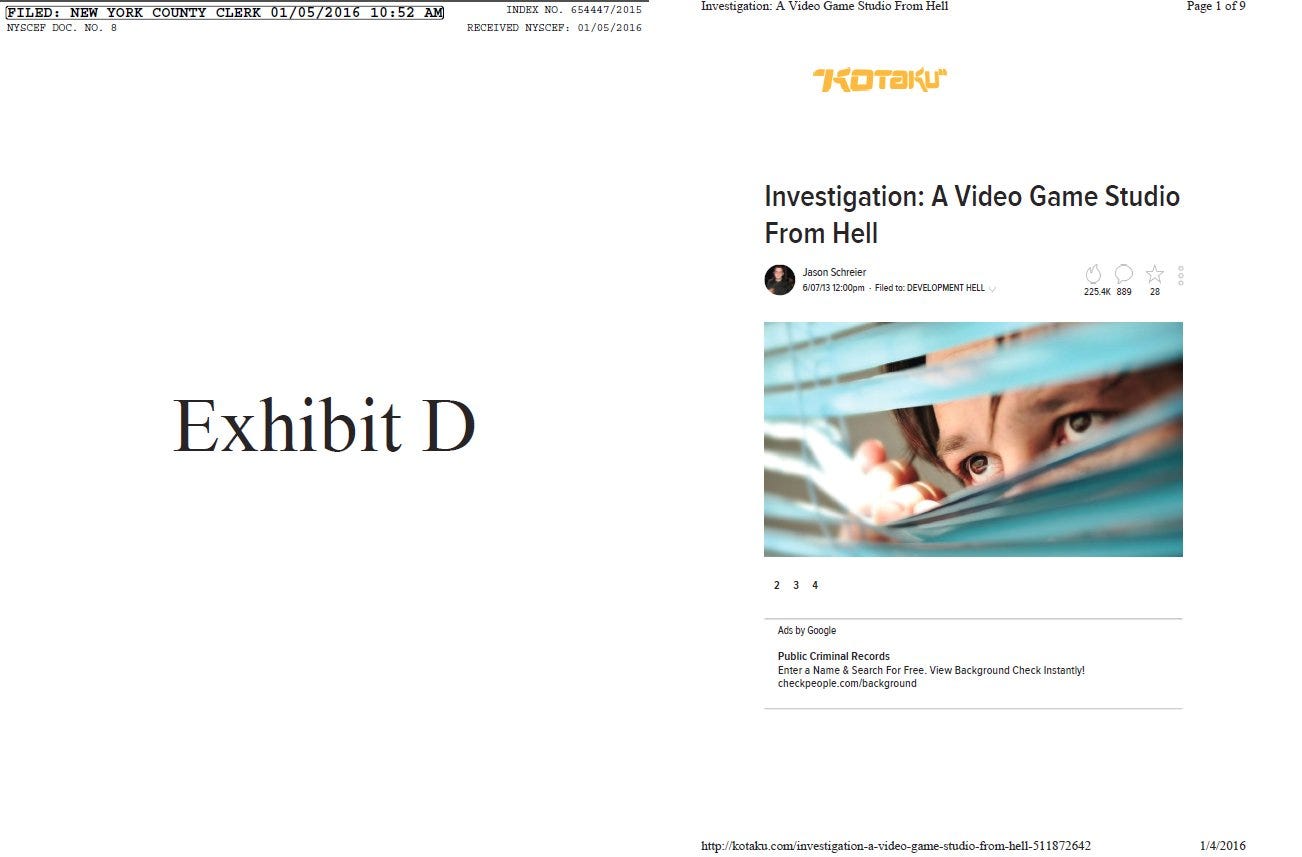Investigation: A Video Game Studio From Florida
(I wrote this back in June 2016. I thought it was very good. The website I originally posted it on has since gone offline. So I'm republishing it here. It was of my first big deep dives.)
(Originally published by me in June 2016.)
PLEASE SUPPORT MY WORK IF YOU ENJOYED.
[Disclaimer: The contents of this article contained herein are for informational purposes only. It does not wholly attribute any criminal activity nor unlawful conduct to any particular individual mentioned in the piece.]
You’re the founder of a successful Indie video game studio. You and your partner sold it to a venture capital firm, raising the stakes of your enterprise. One day you find out that a website published rumors from frustrated employees. By the next day, you’re pressured to step aside from your dream project. You tried to continue to work with the company you built, but then again employees come out and publicly denounce you on the record months later.
The investors pulling the strings want you to keep working with these guys and gals, despite the fact they went on record to smear your reputation. You try and leave the company. You manage to start over and hit even bigger success the second time around. But those investors come back and say you “poached” people from your old studio, further claiming that they own your ideas for the rest of your life.
Now hand over $600 million dollars.
That’s the life that Jeremy Stieglitz had to live for the past three years. Kotaku wrote a “Studio From Hell” piece publishing anonymous statements from people connected to his former company, Trendy Entertainment.
Nine people connected to the Dungeon Defenders game development studio Trendy Entertainment decided to come forward, and let Kotaku publish their perceived grievances online. There are claims of sexism, heated arguments between upper management and staff, as well as accusations of forced overtime. With no clear line between facts and hearsay, everything in that article ended up having a snowball effect on Jeremy Stieglitz’s career and life.
The Untold Story Of Trendy Entertainment Revisited
This is a follow-up to an earlier article published on GameRanx entitled the Untold Story of Trendy Entertainment. There were findings that hinted at the possibility of Kotaku being wrong about their information regarding Trendy, as far back as June 2013; using the public information I had available, connecting those dots revealed some startling truths.
What came after publishing the original article on GameRanx not only verified my findings, but expanded on them to a much larger scale. The story of Trendy Entertainment was that Augi Lye and Jeremy Stieglitz tried to make a video game. But when they hired employees fresh out of college and with little experience, they didn’t expect that eventually those developers would oust Jeremy because they weren’t able to cope with the frustrating demands of the industry.
When Trendy Entertainment and Studio Wildcard entered a lawsuit, Marc Singer, in April 2016, revealed himself as a Kotaku source making a threat on Facebook.
“The people who run Studio Wildcard are literally cancer to this earth and they deserve anything bad that happens to them for the rest of their lives.” wrote Singer. That final sentence solidified my reasons to look into this story.
The June 2013 article from Kotaku about Trendy Entertainment was based on the anger and stress of people like Marc Singer, inexperienced and fresh out of college when he started in 2010, according to Linkedin.
Given to me was what started as just a few copies of emails, but that quickly escalated into several folders worth of material. I have been in contact with at least the same number of former and current Trendy employees as Kotaku had, if not more. While I would not call Jeremy Stieglitz or Trendy Entertainment perfect – it’s become clear to me that the blame was severely misdirected when it came to the flaws of Trendy Entertainment.
Jeremy Stieglitz is guilty of trusting his co-workers too much. He’s guilty of putting his projects and his work ahead of absolutely everything else. But I wouldn’t call too much passion a crime, even in the court of public opinion.
(The office pictures used throughout this piece come from an older article about Trendy, which you can find here)
For people who have no idea what Trendy Entertainment is, they are responsible for the creation of the Dungeon Defenders series of games, along with their Playverse side project.
The Prelude: 2009 to June 7th 2013
I’ll be focusing heavily on the elements of Trendy Entertainment I mentioned in my first piece. Augi Lye is primarily being mentioned here because he’s the CEO. But also included is Philip Asher, the Marketing Manager/Director first brought on board in Nov 2010. Art Producer/TA Director Josh Javahari came on board in Nov. 2009. He was a technical artist, but managed to secure one of the highest stakes in the company, being beat by only Augi and Jeremy.
Let’s set up the scene. The main project of Trendy Entertainment during Jeremy’s time there was setting up Dungeon Defenders.
At March 27, 2010, all you see is just a regular small Indie office.
Marc Singer was there during the last few months of development. In June 2011, he wrote to Jeremy complaining about the current state of one of the levels.
“I am disrespected by the fact that you cannot be bothered to hear my opinion on a matter without yelling “veto” and running out of the room in a fury. I have assumed a position and stature in this company that demands a very high degree of general skill and knowledge, as well as an impeccable amount of skill and knowledge in game balance overall. “I simply ask that you work with me and not against me in an active effort to continually increase the quality of this game. I can not stress enough about the literal physical and mental stress I have gone through to make this the best game possible, and when I am quickly and without a thought dismissed I feel that I am worthless and that I have not shown time and time again that I am the most capable person (without prior experience) in my position that has ever existed.”
This was the foundation of the stress that would build up in Marc for years to come. Singer had only graduated Santa Fe college in 2010, he was fresh out of school. But he was trying to cope with the demands of the workplace.
It’s worth noting that the work environment at Trendy Entertainment under Jeremy had flexible hours.
I just realized that I've been consistently going to the office on weekends and going out to bars on weekdays. #Thankgodforflexiblehours — Danny Araya (@DannyAraya) April 2, 2011
But people like Marc Singer decided to overdo it on their own early on. It’s a statement of awesome passion for his job, definitely. But the way he chose to relieve that stress? Not so great.
The first Dungeon Defenders released, and it was clearly a proud occasion for everyone. Being named in the credits of a video game is a huge milestone for a developer, and it certainly helped Trendy’s (at the time, small) team to have their main revenue stream up and running.
Although I’m technically skipping ahead here – this is the perfect spot to bring up the Trendy Entertainment backpay allegation. Kotaku states that:
“Before 2012, according to two people, the studio had some serious financial difficulties. Staff would go unpaid for long periods of time, and many worked 80-hour weeks because they felt they had no choice.”
Considering the fact that Trendy Entertainment was a small indie studio at the time, this scenario is inevitable. It’s not a case isolated to just Trendy Entertainment, but any similar indie studio across the board would be susceptible to this.
They operated the studio’s early days on the knowledge that money would be tight. In the months leading up to Dungeon Defenders release, there’s records indicating the diligent efforts made to accommodate Trendy’s early employees as best as possible during that time. According to a November 26th 2011 email, Jeremy was in the process of squaring that one-time issue away.
“Looking forward to getting you all of your backpay on Monday as the initial Valve money has arrived, AWWWW YEAH :D”
It would be inaccurate to claim that Jeremy “caused” that issue. He certainly wasn’t exempt from it either. He reportedly worked himself into debt just to make sure Dungeon Defenders would be released at all. It’s a testament of how absorbed Stieglitz gets into his work – a contrast to the other colleagues in Trendy’s upper management.
By the end of November 2011, CEO Augi Lye, Philip Asher, and Marc Singer were partying together. I covered most of this in the earlier article, but as a quick refresher — Fashion Shows, Statue Kissing, Cars being towed, Chatroulette, dressing up as Power Rangers, and booze booze booze BOOZE.
The Booze Cruise Of Trendy Entertainment
In itself, pub crawls are completely innocent. There’s absolutely nothing wrong with alcohol consumption. But symbolically it represented something relevant to our story here.
The people who went on these “Booze Cruises” with Trendy’s CEO are also the ones who would later get promotions and work benefits. This is something that is documented throughout later parts of the article, but the roots of it started in the early years of the company. This was not a dictatorial work environment, but certainly one that had uneven odds involved.
The boozing started to mix with work. As seen in the following example below, the office had some questionable stress relievers.
February 9th, 2012. An email conversation between someone from outside of work and a Trendy employee talks about the work environment. It was presented in this document as a chat log, so I’ll consolidate it for easy reading. The employee says that the “VFX guy has a bottle of vsop cognac and a glass. He does 1-2 a da(y)”. The person from outside of work is in awe, saying “its like you are mad men.”
Trendy Employee goes on to say “our ceo, zi 2.0, has several bottles of scotch. and an embossed crown bottle with the Trendy Ent logo.”
This confirms one of the pictures mentioned in my earlier article. CEO Augi Lye is sitting at his desk with the items that Trendy Employee described. As someone who is intended to be the company’s role model, setting an example for the work force, having alcohol around the office might not be a good mix with the stressful work associated with game development.
Augi Lye took a fair amount of credit for the success of the company. It’s important to remember that despite the differences between the two, Jeremy and Augi were partners. Nowhere in any of Kotaku’s article series on Trendy Entertainment is his name mentioned once. In an article intended to publish employee accusations against a company, it was all leveled at Jeremy, despite the clear and distinct possibility that Augi Lye was behind some of the general grievances leveled against Trendy Entertainment.
Compared to the demonstrably workaholic Jeremy Stieglitz, much of Augi’s executive presence was in fanfare. While Jeremy was the boss of game development, Augi took a great deal of time trying to be everyone’s buddy. It’s entirely possible that Jeremy seemed more harsh in contrast to the seemingly easygoing Augi Lye in comparison.
“Why mention that if it’s outside the workplace?” The other people that Augi partied with were co-workers. Specifically Danny Araya, Philip Asher, Josh Javaheri, Adam Stow and Marc Singer. Sometimes these problems slipped into work itself. A chat had between a Trendy producer and his friend states that the “f*ckers at work going on the BOOZE DUBSTEP CRUISE. all i know is my marketing director was in a coma for 2 days after this. LOTTA alcohol and drugs lol.”
The event that the Producer is talking about is called Holy Ship. A yearly dance party cruise that started back in 2012, taking about 4,000 passengers from Miami to a private party island somewhere in the Bahamas. Asher, Javahari, Singer, and Isom have all taken this pilgrimage at least once (Asher did it for three straight years).
A Vice article verified by Philip Asher himself , details one man’s journey into the Holy Ship experience.
“All weekend, a guy named Sgt. Buzzkill had been warning folks not to bring any illicit substances back to America. Partygoers seemed to take heed because people were handing out free drugs like they were business cards. On the fifth offer I finally acquiesced and dropped acid. Call it peer pressure, call it the tail end of #YOLO, but everybody from the revelers to the artists was tripping balls on the beach. I’m not dropping names, but looking at the dilated pupils and thousand-yard stares of some of the DJs backstage, I’m surprised they kept it together enough to get through their sets. The only sober people on the island were Filipino cruise employees clustered in small groups under palm trees looking on in disbelief as mostly-naked white girls twerked away their student loans in front of them.”
To establish some sort of trend, we’ll need another point of reference. We can look to a chat between these same two people in June 2012 for the answer to that. “Our CEO tossed a beer bottle at a girl in the street from our roof last night.” His friend asks if the police got involved. The producer says “He missed, but it freaked her out lol.” He goes on to say it was the “marketing director’s birthday, so a lot of alcohol and drugs – the trendy way of life.” The producer quotes what appears to be someone else involved in the festivities, stating that they “woke up this morning to 9 gigs of [Duck Tales] episodes on my computer.”
Not only does the producer say alcohol and drugs was a company lifestyle, but he went on to further clarify how that spilled into work. “7 people in our art room, only one is not [hung over],” he wrote.
As far as role models go, CEO Augi Lye seemed like an odd choice to look up to. What people don’t understand is that Augi Lye was the money guy at Trendy Entertainment. Kotaku published (direct and indirect) accusations that Jeremy Stieglitz was responsible for unfair wages at the company, but neglected to mention Augi Lye was responsible for financial decisions.
But there was more to the money than that. An investment deal between Insight and Trendy for buying stock was signed by July 16th, 2012. Philip Asher and Josh Javahari both had a stake in Trendy Entertainment. Javahari was one of the highest holders with 892,962 units, only beaten by Lye and Jeremy. Asher had 285,714 stock units. This would echo across their actions and responsibilities for years to come. They would feel the need to take charge in the company because of this, and Augi would provide bonuses and raises and promotions to these people unbeknownst to the rest of the staff.
That “Boy’s Club” existed.
September 7th 2012. An employee prospect’s email talks about how Augi disappointed him.
“I’m sorry to say that a recent message from Augi brought up some disappointment. For the amount that you suggested when we first spoke, what Augi offered me just now would not have even been worth me loosing as much sleep as I did doing this test, which was perfectly understandable but to be honest after over a year of flawless service to you and this company was already a bit of a downer. And now with this offer, I’m sorry, maybe in a perfect world we can find an opportunity to work together again, as I have utmost respect for you and the rest of the team, and honestly have never known a better collection of talent. If you are truly serious about hiring me back feel free to contact me, but I will have no more dealings with Augi. Sorry to say that but I wish you best of luck on these projects and success in your endeavors.”
Leaving a poor taste in a job applicant’s mouth could’ve certainly had a long term effect of the public’s perception of the company.
Augi arranged the hiring of Trendy personnel, according to an email dated May 1, 2013. The art director writes to Augi saying:
“I’m a bit confused as to why Jeremy and [REDACTED] have been brought into the conversation about my summer intern. This is between me and [ALSO REDACTED] and then your willingness to pay him for his time. Giving Jeremy access to him is not helping me or [REDACTED] and was never part of the discussion prior to yesterday. What’s going on here?”
This art director seems to believe that the President of Trendy Entertainment, Jeremy, isn’t supposed to know about his intern, and wants the CEO of the company to keep it on the down low.
Augi replied back with saying: “For some reason I was unders assumption you didn’t have a place for him but thought he would be good for Trendy.”
It looks like the Art Director just walked all over him.
February 27th 2013. Trendy Employee Chatroom.
When PAX content is over, we will probably have a round table with jeremy about this pace and mad scramble at all times, to restore some order to our level building processes.
The stress of getting a demo together turns into a general discussion about trying to reduce stress in general. But Philip Asher says “there are no round tables here,” shooting down the idea of communicating to Jeremy. Adam Stow asks for suggestions on how to deal with the workflow.
“I’m open to suggestions on how to say “enough is enough” I can tell you that I need more than just my voice to say it.”
“Unless you have something constructive to add about how to change the situation, this is how it is. I’m aware this sucks. I’m completely aware. And I’m sorry it has come to this, but if it takes a full blown effort to gall short to make jeremy wake up, then this is what we will do.”
The pages of this chat are filled with complaints about game development work. That’s a perfectly understandable hurdle to have in any project. But Danny Araya shoots down the idea of working in general.
“What really irritates me adam, is your promise of a “better tomorrow” it’ll get better if we work EVEN MOAR no it won’t. your initial idea of a group “Jeremy knock this shit off” is probably the most plausible thing. Honestly the person I would ask is Phil…”
If Asher knew about the employee discontent, why didn’t he try and defuse the situation with Jeremy directly?
So how did the troubles of Trendy Entertainment really spill over? A former employee (A) who won’t be named had several chats with an outside party that didn’t work at Trendy (B).
That strikes at the heart of one of Kotaku’s accusations they printed in their June, 2013 article. This casts doubt on the claim that Jeremy would force someone to work late hours, when it was really middle management’s fault. There were allegations of sexism, despite one of the female artists receiving a pay upgrade and promotion over all of the men at the company to lead concept artist .
Jeremy writes on May 21st, 2013 that he’s “here to stay” at Trendy.
“I do love the work, the people, and the challenges. It’s a rough ride some times given the incredible load, but I know we can do this and I want to make it happen with this team.”
In a May 22nd, 2013 email from the Insight representative who checked in and coordinated with Trendy, we see that they liked Jeremy as the development director.
“I have an immense amount of respect for you and believe that you alone are the next Gabe Newell of the gaming industry. I also really like you and look forward to continuing to work with you. I would just stress that every additional hour of the day that Trendy collectively spends working toward the common goal, is an additional increase to the eventual exit valuation – an exit valuation that you will immensely benefit from.”
He finishes by saying “You aren’t working for us… we only invested in you so you could continue to work for yourself.”
But discontent and unrest seemed to have been happening within the final days before the article came out.
This sets up a system that makes Trendy employees angry. A mid-level management person had a tendency to blame others for their own mistakes, but also is known to conversely blame Jeremy too. Such an environment and employee habits sowed the seeds of discontent for the Kotaku article to be possible.
The Kotaku Article
To fully understand the Kotaku article, we need to step back a bit to the end of May 2013.
Dungeon Defenders Community Manager Josh Isom called the company racist on his way out the door.
The very presentation of it in the Kotaku article is concerning. The author refuses to share the letter itself, but says sections of it agreed with the overall narrative. Why even mention it in the first place if you refuse to share the whole thing? What do the other sections of the departure letter say that don’t fit the story? That could add context to the aforementioned complaints. To rectify this, here’s Isom’s letter in full.
“To whom it may concern, My name is Josh Isom, and I am the lead community manager at Trendy Entertainment. Today is my last day of employment. I haven’t received an exit interview nor have I been contacted by any executives as to why I’m leaving. That’s okay. They’re busy gentlemen with plenty on their plates.”
“To be clear, the reason why I’m leaving is simple — upper management does not respect its employees.”
"Upper management does not respect the women in the office by paying them less than their male counterparts. It does not respect the ethnicity of its employees by remarking about the “comfort level” of skin color for heroes and whitewashing the ethnicity of the heroes in general. It does not respect the department leads by denying them creative control over their departments, which is detrimental to company morale and to the quality of the game. It does not respect the marketing/community members of the team, treating them as if they are inessential to the company (further proven by the lack of contact when it comes to my resignation).”
“Above all, it does not respect its employees on a basic human level. Employees are often publicly belittled in front of their peers for their perceived incompetence. They work in perpetual crunch where they work weekends year-round with little thought to their mental and physical capability to produce high-quality work at such a constant pace. Time and again, the talented people in this office are treated as inferior people whose time is not worth a fraction of the time of upper management whose input is worthless, whose employment is expendable.”
“Trendy is a toxic environment, and if things do not change, I fear its well of talent will run dry.”
The Kotaku article itself identifies Josh Isom by stating he “sent a letter to the staff of the company”, and anyone in the community itself would’ve seen the only person to write a public letter of resignation around that same time would’ve been Josh. Writing a bunch of letters at once certainly displays the emotional investment the guy had in his job, if nothing else.
Josh Isom would go on to work as the community manager of Prime World: Defenders, a direct competitor to Dungeon Defenders and Trendy. He joined Marc Singer, who also arranged the Kotaku article with Jason Schreier. (archive)
Let me just emphasize that a bit: Marc Singer and Josh Isom of Nival decided to give bad press to their competitor. They wrote negative things about Trendy Entertainment and Dungeon Defenders II development, releasing that article at the same time they were pushing their own game Prime World: Defenders for Nival.
Josh Isom does not mention Jeremy Stieglitz by name at all, in public or private. Kotaku’s knowledge of that, combined with their willingness to still use the letter to further blame Jeremy solely for the company’s issues, is one of the most egregious things I have ever seen.
Isom would later come back to Trendy Entertainment despite being involved in a public attack against his employer. He wrote those things directly to his bosses, but refused to put his name on it when it came to going public. Oddly, the only direct citation of racist language was seen by Augi Lye in that imgur album from Trendy Damsel.
But Philip Asher also tried to resign on May 24th, 2013. He tried to get Josh Isom a promotion to Marketing Producer, but Jeremy didn’t think Josh was qualified enough for the position. This falling out led to Josh’s departure decision, as noted above.
“To whom it may concern, I would like to inform you that I am resigning my position as Marketing Director at Trendy Entertainment, effective June 7th, 2013. This resignation was accepted tonight by Jeremy Stieglitz. Thank you for everything Trendy Entertainment has done for me, I have enjoyed watching the company grow over my 2 years and 7 months here.
Sincerely, Philip Asher”
People DID leave Trendy Entertainment, but as seen above, it wasn’t as clean as Kotaku made it out to be.
An email from Augi to Trendy’s investors at Insight states “The sexual preference allegations are completely false. We know exactly who this referred to and it was the difference of 3 year experience and 10.”
I’m actually going to go against what even the chatlogs I found say, and consider an alternative answer. I would say that Augi Lye was disconnected from Trendy’s comings and goings enough to actually not understand how something like this would happen.
Enter “GraceIsUnfair”.
The man behind GraceIsUnfair, reveals enough information to find out the identity of his female friend. GraceIsUnfair and his lady friend both left 38 Studios in May 2012. Given his description, it can be narrowed down to two individuals. GraceIsUnfair went to school for an extra two years, he went to a private college while his female friend went to a for-profit institution. Not only that, he had over two more years of work experience. While Art is considered a subjective sort of career, even numbers fall in his favor.
I don’t understand why GraceIsUnfair would’ve misled Kotaku, but the article doesn’t mention that the man and woman mentioned in this part were personal friends. That in itself allows room for deception on how events transpired. (He had a Twitter here, but he must’ve lost his password and chose to name his new Twitter account “UnfairGrace”.)
He went to the Private University of Ringling School of Art and Design for four years, according to Linkedin. His female friend went to a for-profit school for two years. He happened to choose one of the worst possible names in the world for his new Twitter account. That’s public knowledge, and free for me to point out. His female friend will go unnamed, because it seems they wanted to air their grievances more privately than “UnfairGrace”.
Augi confirms the Skype chats as being correct, saying they were made to “4 guys in management”, according to an obtained email. As you can tell by the Kotaku watermarked screenshot, the Skype logs are presented out of context as three separate quotes. What exactly is the crime here? Bad jokes made in private to four different dudes? Jason asserts that it was just four employees, not clarifying there weren’t any women in the chat here. Further tweets back around at that era make mention of the office norms at that time.
Dungeon Defenders is only an IGN downloadable game of the month because of @DannyAraya sexy Huntress image — Philip Asher (@pmasher) December 5, 2011
@tehstevebat Haha, Jerome (character artist/3d modeler) really loves his midriffs (to be showing)— Philip Asher (@pmasher) December 23, 2011
It seems as if Marketing Director Philip Asher understands what joking around means. Did anyone from Trendy Entertainment really have a problem with those quotes, or was it just interpreted by Jason as something that could be interpreted as uncomfortable by someone if they saw that at a quick glance?
The implication seems to be made that Dungeon Defenders shouldn’t try and market their game. Sex sells. Art is subjective, but there are things that people do when advertising a game to try and make it appeal to as wide of an audience they possibly can.
What the Kotaku article didn’t show was that this was done to male characters too (as evidenced in the above image showing the male Elven hunter. According to nature, when boys and girls grow up to be adults, they physically mature to reflect that.
But according to the author’s later writing about female breasts, he finds them scary.
It’s not a challenge to look up Trendy’s executives. They eventually put them on the front page of the website, which makes absence of any mention of executive staff besides Jeremy at the time of the article much more odd. Kotaku could have named Augi Lye or Linda Hoyos in their initial article, that information was public and readily available. But instead, they decided to only name Jeremy Stieglitz. All Kotaku had to ask was “who handles the money at Trendy Entertainment?” And they would’ve been told by their sources that Linda Hoyos was a part of management staff.
Chief Financial Officer (CFO) Linda Hoyos would probably disagree with the “Hire a woman – we can pay women less than we can men” quote. Not only was she the CFO in 2016, but she held that position long before the Kotaku article came out in June, 2013. To attack her ability to manage finances goes against the point Kotaku is trying to make here. Not only did she have a hand in the hiring process, she was paid fair and equal compensation for her time.
There’s also no visible pattern of gender favored pay. According to the legal definition about what is defined as gender-related unequal pay, it states:
“The Equal Pay Act of 1963 was intended to end that discrepancy. The law stated that “no employer … shall discriminate, within any establishment in which such employees are employed, between employees on the basis of sex by paying wages to employees in such establishment at a rate less than the rate at which he pays wages to employees of the opposite sex in such establishment for equal work on jobs the performance of which requires equal skill, effort, and responsibility, and which are performed under similar working conditions.” The only exemptions to the law were for seniority, established merit systems that paid all employees based on job performance, systems that paid wages based on the quantity or quality of the work produced, and wage differences that were based on some factor other than sex.”
One person’s lofty accusation of that without evidence to back it up shouldn’t even have been printed for that Kotaku article in the first place.
Many people I talked to connected to this situation on either side couldn’t believe this was thrown into the mix of the article. People who knew Jeremy closely said he did that to pretty much anyone, and that he didn’t single women out. When it comes to Brian Goodsell and his girlfriend “Functiontype” however, it starts to make sense.
Goodsell has been a Technical and VFX artist for Trendy Entertainment since 2012 (via LinkedIn). Much like Marc Singer, this appears to have been one of his first jobs in the gaming industry. When the Kotaku article came out, he was one of the only current employees up front about it at the time, making a tweet.
On it’s own, there’s not much to see there in the tweet. Goodsell knew how to keep his head down. But then “functiontype” happened, tweeting about the article the day before it came out, as well as sharing it the day it released. What hits home the motive, is the fact that functiontype went to the Kotaku comments to further discuss the article’s content.
Functiontype called the producers a problem, and stated that she knew people that worked there and that this article was “all truth”. They were also confident in Jeremy taking the blame for the fallout that would come after the Kotaku article. As far as possible motivations go, you can see other comments alluding to that here and there, showing that functiontype is very politically active in their online habits.
Functiontype wasn’t directly involved in Trendy’s affairs, but seemed more and willing to state their perceived reality of the situation. It’s unknown if politically charged intentions were taken into consideration by Kotaku prior to publishing the piece. It’s concerning that this outside person was given the same amount of merit in the article, given the further distance from the situation they’re in.
Brian Goodsell seemed very withdrawn from the situation publicly, but that silence is deafening compared to the statements made by his girlfriend. The prior knowledge of the article that functiontype had before its release, indicates that both her and Goodsell played a potential part in the content creation.
Even the PR response by Trendy to the Kotaku article comes into question. It’s implied by Kotaku that Jeremy was behind that company statement, but it was Philip Asher with help from Sandbox Strategies that wrote to Jeremy and Augi, drafting the response. Asher thinks the questions sent from Kotaku were juvenile and had no factual basis.
Sandbox suggests, and I agree, under no circumstances should we respond to the individual questions line by line. They are incredibly juvenile, and will only make the story spread. It’s very likely he will never print these questions, since they have no factual basis, unless you specifically respond them.
What specific questions did Kotaku ask? According to an email from the author to Jeremy, these were things that Kotaku requested for comment on. Kotaku gave Jeremy only a few hours to respond, stating to him that they’d publish “tomorrow morning”. From an email dated June 6th 2013:
– We’ve heard that crunch time has been the norm at Trendy, and that employees have been forced to work six- or seven-day weeks for quite some time now, with 10-hour days, minimum. Some have said that you have threatened jobs if staff don’t come in on weekends, or if they try to take time off. Would you like to comment on these allegations?
– Is it true that the Dungeon Defenders 2 team has been operating with the motto “If League of Legends does it, we do it”?
– We’ve heard that at one point you told staff to make sure a black character was “comfortably dark.” Is there any truth to that?
– We’ve obtained emails showing that two different employees one male and one female applied for the same position, and that Trendy offered the male almost $1,000/month more than the female. Similarly, we’ve also heard that you told staff that you want to hire female developers because you can pay them less than male developers. Would you like to comment on any of that?
– We’ve obtained a Skype log of you saying that you want one particular robot character to be “sexy for a robot android and thus make people a little uncomfortable.” In the log, you also say that you’d like the character to be “under 18 robot years.” Would you like to comment on that?
Further corroborating the politically charged accusations of racism from Josh Isom, Kotaku specifically asks Jeremy about it. The simple fact that Kotaku didn’t publish those allegations against Trendy proves the potential lack of substance against any of the other talking points.
That’s a broad accusation in itself. Contractually speaking, payment was set in stone at Trendy Entertainment to a predefined yearly number (in nearly all cases, with one or two exceptions). But alongside that, people also had the opportunity to acquire bonuses for hard work. What’s not mentioned is the partying that took place in seemingly every other waking hour of select employee’s day-to-day routines.
On a related note, it’s important to hit on this next point a second time, even though I had covered Marc Singer’s Facebook post in my first Trendy article. This statement to Kotaku was given by Marc Singer anonymously at the time.
There’s no official record of Marc Singer ever asking for time off to attend his cousin’s funeral. There’s enough email evidence to safely conclude that Jeremy would have said “Yes, you can go to the funeral,” however. But on April 17th 2016, three years later, he decided to reveal himself as a source of Jason’s via a public threat on Facebook. If that was the only time that Marc Singer made a public threat against people he worked for, Kotaku couldn’t have possibly known that. However, there was another example of this occurring, in a time before the article took place, February 17th 2013.
This indicates a clear personal grudge against Studio Wildcard personnel who were Trendy employees at the time of Jason’s article. There’s no other way that post could be interpreted, it’s fairly straightforward.
Kotaku based their article on someone who had a record of poor behavior towards Jeremy. Not once did it dawn on Kotaku that taking the words of a threatening individual at face value, and printing them as facts, could potentially cause problems. Not even Marc Singer’s friends were willing to condone the things he said online. When mentioning these posts, they distance themselves as much as possible from any sort of association with that person.
Insight spent $18.2 million initially and then provided more money as Trendy ran dry. Of the initial $18.2 million, $8,221,638.47 was paid out to equity holders to purchase their equity. Trendy spent the rest of the money over the next few years as it hired more and more people at inflated salaries. Additionally, equity holders (Philip, Javahari and others) were given raises well beyond the standard pay grade for their experience level and skills. Augi started bloating costs above $500k per month, after Jeremy’s position was changed as a direct result of the Kotaku article.
Additionally, an Augi email in July 2013 to Philip cites the cost of Dungeon Defenders 2. “So the DD2 is a 10 million dollar budget game development cost,” according to him.
By what appears to be a company wide email, Augi made what he refers to as a “personal plea” to staff that they should…
“Please refrain from talking to anyone in the media especially Kotaku. Philip and our PR firm are formulating a response and the success of their work greatly depends on us not talking to the press,” […] “The best way to get over this is by allow the experts, Philip and our PR firm to do their job.”
The whistleblowing employees seemed to have ignored that request. Kotaku approved the comment describing the article as a “victory” before “the next battle”. But when it came to allowing a comment that questioned the narrative of the piece, it got stuck in the pending approval queue. Luckily, it was recoverable by finding a direct link from an outside source. So you can find the comment here.
The IGDA statement between both documents is also not made clear. Compare it between Kotaku and Polygon, you’ll find a key detail left out. While it’s entirely possible that Kotaku was given a separate statement from Polygon, the way that Kotaku words the preface of the quote casts doubt on that notion. There’s a clear and distinct difference between “take any action against Trendy Entertainment” and having “no direct knowledge of the situation.” The former reinforces the idea that Trendy Entertainment is some sort of company that “did wrong”, and somehow the IGDA was seemingly convinced by Kotaku’s presentation within the article’s contents. However, when you take the additional part of the quote as seen by Polygon, it changes the tone of the quote entirely from factually based to hypothetical. Reading only Polygon’s “Studio from Hell” iteration, the reader is under the impression that the IGDA is just stating their position given the possibilities presented by Kotaku’s original piece.
While we have no direct knowledge of the situation, if the media reports on the working conditions at Trendy Entertainment are accurate…
Here’s a comment from DMFlex (the username of former employee Robert Godwin), who was a Trendy Entertainment QA lead from March 2011 to April 2012, according to Linkedin.
We’ve reached the end of the Kotaku article itself, but the aftermath of that in the days, weeks, months, and even years that followed is still to come. This one article about Trendy haunted the company like a ghost, setting in motion a sudden shift of direction for Trendy Entertainment.
In the Days that Followed
This section is about Jeremy switching to a different project, in light of the Kotaku article wholly blaming him for the workplace environment of Trendy Entertainment. Augi is never mentioned once in the initial Studio from Hell piece, nor is he named in the follow-up on the day after.
Let’s see what Kotaku had to say.
If I was just another reader and I saw that part of the article? I would make the assumption that Jeremy Stieglitz was the only one responsible for that. What Kotaku glosses over is that Jeremy Stieglitz was willing to personally sacrifice a significant amount of money for the sake of continuing to do his job in the best capacity possible. He decided to start a separate studio, but still maintain good terms with Trendy at the same time.
On the very same evening of that June 7th:
– I’d forfeit my royalty bonus on DD1 and any future games-I’d help manage the Playverse development along with [REDACTED] and [REDACTED].-I’d help transition the Coop game to new leadership using a full design I have ready and help consult on it as well as needed, and any other Trendy matters.-I could also work for the next month and release the DD2 PvP game with the team, on-time. And work for a month afterwards to help with transition and post-launch service. That is still 100% viable.-I’d start a new separate company, funded by me, to work on a Unity Playverse game. Insight/you/Trendy could have a ##% equity stake in this company, and Trendy could get a ##% royalty on its Playverse games. I’d need to have the option of recruiting (if they are willing) the following people to work at the new studio on it (and on the related Playverse tech): [REDACTED]Please let me know asap if those details are gonna work for you. I’d like to have Insight confirmation of that by EOD Monday, and then something basic papered by the end of next week.I believe in Playverse, and Trendy, and this approach will lead to the strongest technology platform that we can achieve.
June 8th, Augi writes to Insight about Jeremy’s plans.
Had dinner with Jeremy and ironed out the deal terms. Put Jeremy on a real guilt trip and had him give up equity in this new studio to ensure all focuses are aligned.
By June 9th, a Google Doc titled “Problems with Trendy” had started. Daniel Araya, “Phillip Masher” (Philip Asher), and Josh Javaheri were trying to plan the future of Trendy after the Kotaku article.
“It needs to be thoroughly understood that no single person should have the same decision-making power that Jeremy had in regard to the development of Dungeon Defenders 2 (Or any game for that matter.)” Araya said.
Asher was mostly concerned about the future of the Design lead position. “We cannot throw a vision holder in this position who wants to radically alter the existing course of both games’ developments” he wrote.
Javaheri voted for Adam Stow to take the position. “[I’m] in favor of Adam, at least in the short term. I think we need to begin the hunt for a serious veteran and experienced creative director.”
Adam himself had a few things to say. On the topic of vision, he said that “We have never had a visionary leader, someone who inspires and says F*** YEAH, PRODUCT.” He then remarks about a fellow employee, saying someone “has been nothing but [mediocre] since he has started and is paid more than any other environment artist. It is disgusting. He is disgusting. He doesn’t even use a tablet and refuses to learn how to paint.” On Jeremy, Adam said that he “has never participated in a team fight in this entire f*cking game as studio lead.”
Overall it seems odd that a group of Trendy’s employees have taken it upon themselves to dictate the company’s future. This struggle for control would turn from days into weeks.
In the Weeks that Followed
This period at Trendy is defined as the struggle for control.
June 16th, 2013. A little over a week after Jason’s article. [EMPLOYEE] writes to Insight, describing the current state of the company. “After the kotaku article, Adam approached me and asked that I sit in on one of the “Design Committee’s” sessions,” he says. “What followed was a 2 hour fit of chaos that was largely dominated by arguments with no proper structure in place.”
This statement by [EMPLOYEE] makes an indication about the effects removing Jeremy had on Trendy as a company. Without a clear leader and direction, there was no way to maintain order.
“Trendy is currently in a serious state of chaos. Few people are actually doing any work while others sit idly. Trendy is currently leaderless, and there is a colossal power struggle brewing between several parties that are not qualified for such a position. Unfortunately, no one has the qualifications necessary to lead this studio currently when it comes to critical design decisions.”
On June 17th 2013, Philip Asher decided to contact Insight himself, instead of going to the CEO of Trendy. He decided to keep the representative “in the loop” about the state of the company.
1. [ALSO REDACTED], who is one of the most skilled designers here, said he’s 100% leaving and has put in the 28th as his last day to [REDACTED] (who he still thinks is his superior), Josh, Adam, and I pulled him aside and he told confidentially his employment is still up in the air depending on what happens to the design team and [REDACTED]. Augi implied to Adam he is willing to lose [ALSO REDACTED] to keep [REDACTED], which is unfathomable.
Augi says Jeremy is going to steal [REDACTED], our most skilled designer and a great gameplay programmer, in “2 weeks”. […] He really understands what we do and the process and is a huge asset to the design team. I don’t understand how this would be allowed to happen…
Augi is being adamant about keeping [REDACTED] on the design team. The design team is saying it cannot function with him in the room. [REDACTED] is the only one who has not finished his assigned design task from the previous meeting. Adam, Josh, & I are going to proceed with the design team to the best of our abilities to prepare a plan for PVP and get this important work done.
Augi doesn’t understand the difference between the Executive Producer role Javahari wants and a “Creative Director” role. They are fundamentally different, no one wants the latter but we the former is needed in some capacity as some role.
Augi is still playing dumb about [REDACTED] to Adam and the team. There is a rumor going around about Augi having him work on a “Dungeon Defenders” card game, which is inane.
Augi is still pushing for the August “monetized and Steam founders program” release. The team and I disagree with this unless it is an extremely soft launch (from a marketing, business, and design perspective)
This is revealing for a number of reasons. It’s a display of disrespect to the position that Augi holds, and Philip Asher isn’t afraid to berate Augi in his email to Insight. Since the Kotaku article, Asher took it upon himself to be a “Team Leader” for the company.
Overall, people were very happy with your visit and feel you understood their issues. They are a little concerned now though, because they don’t think Augi understands them and are taking that as a reflection on the board’s competency.
Philip Asher directly calls Insight incompetent, and says that the people think Augi doesn’t understand their needs. The same things that Jeremy was accused of in the Kotaku article. It’s almost as if there was a mistake making Jeremy step aside.
The June 17th conversation between Insight and Augi. The Insight representative says to Augi:
“I gave you the data and feedback I got and told you I trust you to make the decision. I’m not going to judge whether people are out for blood and being childish or if there are real issues that have caused people to quit over someone who has been problem to be a perpetual liar and someone who has been shown to be a poor leader. Again just giving you the data so you have it and can fix the issue. 95% of everyone I spoke to had personal issues with [REDACTED]. It’s not my position to decide, just to provide you with the data and suggestion.”
What Insight is basically saying here, is that they’ve come to the conclusion that Jeremy wasn’t the main problem, but someone in middle management was.
“What I learned was there existed a totalitarian regime under Jeremy and [REDACTED], and a lot of people feel they just sit around until they get yelled at yo do something that they then feel [REDACTED] took credit for. I actually don’t care if they are correct factually, they are correct emotionally and in this situation that’s really all that matters.”
Insight didn’t care about the facts of the situation, but rather based the truth off of feelings. They allowed Jeremy to take the blame for something someone else was responsible for, knowingly. This brings an overall concern as to the thought process on Insight’s part, at least. But Augi took it a step further, and denied the unnamed middle management employee at Trendy was a problem. Responding to Insight:
[REDACTED] is a non-issue. His decision really is based on his girl-friend. People are really out for [REDACTED]’s head. I’m sure you know that.
Also on June 17th, Josh Javaheri made an attempt at climbing the corporate ladder. An email to Lye and Insight stated his proposal. “Augi and I spoke about this on Friday, but I wasn’t given a very clear direction as to if he felt this was the right direction for me,” Josh said. “My argument is I know the product, I know the talent at Trendy, I know the game and its fans, and talking with Phil I feel like I know what we can expect in the coming months.”
By June 27th, a deal to hire Joshua Javaheri’s girlfriend was in the works. “The company structure needs to [veer] from any perception of favoritism I’ve already been getting flack from other people on this issue,” Augi wrote to Josh. “Hiring a girl friend is very risky and is considered nepotism.”
Then he offered to give her a job. The fact that the offer itself was even made in the first place, regardless of whether or not there was any follow-through, is telling.
By July 11th 2013, the Vice President of Finance at Trendy sounded confused in their email to Augi.
“Doing payroll today and in my folder I found a form for Philip that shows the increase to be done with this pay period. If you recall, a few months back, you told me that on July 1st, we would increase Philip’s pay from $##### to $#####. Shortly after that, he had wanted to resign and then all broke loose…”
I censored the numbers out of a courtesy, and the increase itself was a ##### step up between before and after. A question that sadly will remain unanswered is why a pay raise would upset Philip Asher, assuming the two events are even related. It lines up with around the time he tried to quit the company; so as far as it seems it looks like Augi tried to bribe his friend Philip into staying longer at the company.
In the Months that Followed
As early as July 26th 2013, plans to have Kotaku follow up with Trendy were in the works. According to an email from Augi they were planning to “invite Kotaku to visit the studio” around the time of the PAX convention. He explained it would be “a huge marketing boost for the game and company. We’re coordinating with our PR company to make the biggest impact.”
(Ironically, Josh Isom would say it was “no PR move”.)
It's no PR move. Everything I hear from my friends at Trendy is that the studio atmosphere has improved dramatically. http://t.co/kJuMXTpXAO — Josh Isom (@iamisom) October 17, 2013
I don’t know who else Augi told that information to, but it managed to spread around the office rather quickly. By July 28th, Troubled Trendy got back in touch with Jason Schreier. Jeremy was out of the picture at the main Trendy studio. Whoever Troubled Trendy was (disclosure: I do not know either), they wanted to finish what they started and have Jason Schreier write another news article. All that can be said for sure is that someone who had knowledge of Augi’s position in the company, coupled with the proposal that Jason was going to do a follow-up of some kind about Trendy, led to Troubled Trendy’s desire to get back in touch with Jason.
A group message sent out on September 18th, 2013 from Augi titled “Notes from the CEO” is sent to every Trendy employee. It details the basic knowledge of the finalized deal for Jeremy’s future with the company. (SKIP DOWN TO “PLAYVERSE” FOR MORE INFO)
Hey Everyone,
In the past when Trendy was less than 10 people, communication was not a problem. I knew what everyone was doing and likewise everyone knew what Trendy was planning. Today, Trendy has grown and those lines of communications are not as efficient. Moving forward I want this to change and be more open. However, there are some issues that I am unfortunately not able to discuss. In regards to Nom Nom Games, I can relay the following information:
– NomNom game is now a wholly owned subsidiary of Trendy Entertainment.– NomNom Games will function as a separate entity with their own budgets, staff and resources.
– The only Trendy Employees allowed to work for NomNom Games are [REDACTED] and [REDACTED] . Everyone else is prohibited to work for NomNom Games unless given written permission from Trendy’s CEO Augi Lye. Administrative services such as accounting and human resources will also be shared.
– NomNom games is located in a separate office adjacent to Trendy.– Access between offices will be limited.
– Jeremy is still Trendy’s CTO (Chief Technological Officer) and Board member– As CTO, Jeremy will be developing playverse and game engine services
– This will neither affect Trendy management, nor will it impact the Dungeon Defenders 2 project, schedule, or budget.
If you have any further questions please speak to your direct supervisor or if you my door is open please feel free to chat with me.
The key point here is that Augi Lye tells the entire Trendy Entertainment staff that Jeremy still works as a part of the company. The effects of the Kotaku article snowballed to the point of creating two separate offices under the same company. What could possibly go wrong with two different groups – one with the main Trendy employees, and the other with people that answered directly to Jeremy?
Augi Lye was Jeremy’s business partner, and he tried to balance that with still being the “cool boss” to Trendy staff. This compromise was a huge mistake in the long run, as a separate office meant Trendy’s attention was divided, their resources needed to be split, and in the end, less work gets done at the end of the day.
Yet Trendy decided to still follow through with the follow-up article at Kotaku.
On October 17th 2013, Kotaku returned to the Trendy story with their Four Months Later article follow-up. Keep in mind that Jeremy still works for Trendy Entertainment, and yet Augi arranged a follow-up meeting with Schreier to basically talk about “how much of a failure” that Jeremy was. They had the chance to directly clarify about that middle management person being the main issue, but each and every person in the follow-up article chose to just blame Jeremy instead. By not denying the more outrageous stuff, like the Marc’s cousin’s funeral bit, they implicitly approved of it being printed anyway. They had the chance to say “hey, Josh Isom wrote that angry letter to Trendy’s management because he was mad about not getting a promotion,” but chose not to bring any of that up.
Jason opens by making reference to the plans Augi made back in July.
“Trendy hadn’t used external PR companies before,” is an inaccurate statement. The response to the June 2013 article was created with the help of Sandbox Strategies. This could have been unknown to Jason, of course. But it’s worth clarifying regardless. In a change of pace, Jason is willing to name the people who are going to be saying things about the company. In this Trendy and Sandbox Strategies approved trip, it’s not breaking any rules. Phil Asher, Laura Muriel, Jordan Kerbow, Danny Araya, and Daniel Haddad.
The same Philip Asher called Kotaku’s questions “juvenile” and that they had no factual basis. It’s a complete 180 degree turn in terms of allegiances for Asher. He not only tried to quit two weeks before the article came out in June, but he hired the PR agency that would deal with the article’s fallout (and arrange his trip to Kotaku) a mere one week before the article came out.
It’s now firmly understood these particular employees had some sort of problem with Jeremy. I mean this is a “follow-up” article, which means it must be connected to the one preceding it. That’s the assumption a reader would make taking a glance at the presentation of this anyway. Some of the people reading that article might be in the game’s industry themselves, and they’re probably saying “Wow, let’s never hire these people if they need a job. We don’t need an employee creating a ruckus with the Gaming Press.”
Jason gave a shoutout to Troubled Trendy here, who told him about Augi Lye. I even asked Schreier if he ever acknowledged the possibility of another side to the Trendy Entertainment story, and that’s what he pointed to. That one paragraph.
Laura Muriel is mentioned by name in the article, but she had never had come up previously up until this time. Laura Muriel served as the Community Manager at Trendy Entertainment LLC from October 2011 – May 2014, according to Linkedin.
Massages? Bars? Video Games? JOUSTING? What a horrible and terrible place Trendy Entertainment must’ve been under the iron fist of Jeremy Stieglitz. But in all seriousness, this is the side of Jeremy’s Trendy Entertainment that Kotaku failed to mention at all. People had fun, too.
If it seems odd that I’m pointing out seemingly normal stuff, that’s the point of it in the first place. It wasn’t all doom and gloom. I guess a Super Smash Bros “Final Destination, No Items” match IS abusive though.
What about “sexism”? According to multiple sources, Laura freely dressed up in revealing clothing on her own accord. Despite the supposed “uncomfortable” atmosphere, Muriel felt perfectly comfortable wearing whatever she wanted. “decided to do something special for the Trendy guys with Jennifer Kim!” they tweeted. Directly contradicting the idea presented by Kotaku about Trendy women and the workplace. The main Trendy Twitter account was more than happy to share this news with everyone, too. This situation wasn’t clarified when Laura went to Kotaku and claimed that Trendy was a sexist workplace.
Nor was the Casual Tuesday situation. “WHY ARE YOU LINKING THAT CASUAL TUESDAYS PICTURE YOU PIG.” Josh Javaheri made a Reddit thread about it. Philip Asher (Trendy Entertainment Marketing Director) directed people to “bother her”. But again, this was ignored when Philip Asher went to Kotaku to push the claim that Trendy was sexist. Doesn’t really seem to make much sense. I’m not saying that the claim of sexism at Trendy is entirely untrue, this is just meant to provide another side to that story.
The Kotaku article finishes in a moment of near self-awareness.
The problem with the overall theme of this Trendy article is the implication that Jeremy (who is still an employee at the time of this company approved PR attempt to save face) is the big villain of this story. Not exactly the whole truth, considering that wasn’t what Josh Isom said in his May 2013 departure letter. Nor were the concerns of Troubled Trendy given a fair representation in this piece, as Augi Lye’s involvement with the company isn’t explored at all.
But then again, the Trendy team at Comic Con looked like they were having the best time ever. The expo took place shortly after the Kotaku follow-up article was published, and it seemed as if they had figured out some sort of direction to take the company in from there on out. While some key things are left out of that follow-up article, maybe the spirit of it was accurate. For the time being, the main Trendy Entertainment team had plenty of time and resources on their hands to try and deliver a different vision of the Dungeon Defenders 2 game.
Do you remember the previously discussed Community Manager, Josh Isom? The one who called Trendy Entertainment a bunch of racists and sexists? The one who decided to go with the “Studio From Hell” article in the first place, contributing a sizeable portion of it? Then after, going off to work at a competing video game studio with another former employee of the company (who also made attacks against Trendy’s reputation)?
Josh Isom came back to work at Trendy towards the end of November 2013, only six months after his initial heated departure.
There would be no clarification by him as to how or why he left in the first place, and the circumstances surrounding his return. After breaking the probable non-disparagement agreement when he helped Kotaku’s Studio From Hell article, Kotaku source Josh Isom went right back to work at the company and community he left in the first place. The damage was already done and Josh could have taken the time to mend the fence properly, in any of the months or years following that article, but he chose not to do that.
In the Months that Followed II: Playverse/The Break-Up
The work that Jeremy did for Trendy Entertainment needs to be fully explained, as Kotaku neglected to give it the necessary mentioning. They pushed Jeremy off to the side, while he had a high role at the company.
From Augi on July 31st, 2013.
I am happy and relieved the lawyer closed on the Jeremy deal. Its great having Jeremy back. [REDACTED], Jeremy and I nailed down the Playverse production pipeline. Trendy is far stronger now that Jeremy can focus on what he does best: Tech.
Jeremy expressed optimism the following day, in a reply.
I like Playverse and Dungeon Defenders and want to continue working on these things at Trendy or as part of a future company after a sale.
Also on July 31st, there was an email thread dedicated to the first project of Jeremy’s new studio. Augi was…
“[…] super excited about the Monster Madness port to Playverse. This is an opportunity to throughly document the process for other studio to follow and also an example of how easy and quick it can be done.”
Jeremy added that he was…
“[…] excited to work on this game too! It’s going to do very well, and show off quickly — this year — what Playverse can effectively achieve for a small developer.”
By August 2013, Augi was able to score office space for NomNom.
I just secured the space for the World of Z team (literally 50 feet away on same block in newly renovated space). I’m planning first week of September for the move. FYI, if you want that new space for yourself. You always have first dibs.
Then the notes from the CEO email goes out, as noted in the previous section.
Given the difficulties of the past few months, by the end of October 2013 Jeremy seemed excited about the progress made on Monster Madness Online. He had already implemented a “Capture the Flag” style game mode, as well as having optimized HTML5 technology running under the hood. To finish it off, Jeremy was even able to provide an outline towards monetization strategies. I won’t go into details about what they were, but it was definitely ahead of the curve at the time.
Screenshots of what the game actually looked like were harder to find, but you can see what the game was going to look like based on what was revealed to the public.
On April 1st 2014, Monster Madness Online was delayed for several months. The archive.org link of the announcement redirects itself after a few seconds, so you can find a screenshot of that page here.
“The NomNom team has undergone a major development shift over the past two weeks, to focus on a different game project. We can’t reveal what it is yet, but I can say that if you’ve enjoyed Monster Madness Online, you’ll definitely have a ton of fun with this other game. The team will be returning to development of MMO later this year, but this means currently delaying Monster Madness Online for an ultimate release towards the end of the year. No April Fools on this one, MMO development is delayed by 6 months, alas. It’s been quite a ride over the past several months, and we have hugely appreciate the friends, feedback, and insight that we’ve been able to gather with you all through the various numerous open & closed playtests. We believe that MMO will become the great cross-platform game you’ve been waiting for, but for now, we want to thank everyone for playing with us, and leave you with this poster to indicate that like a good zombie (or Dracula)… MMO Will Return!!!!”
Unfortunately, it was not as cut and dry as Jeremy had made it all publicly seem. Much of the discomfort had happened because of interactions between Nom Nom and Trendy.
Going back to December 18th 2013. Email to Jeremy from Augi.
Hey Jeremy, We’re all excited about MMO. It is going to be a hit. What I need to approve this: 1. Solid launch date you feel comfortable with. 2. We both need to renegotiated rev share deal with Valve. According to Brad, if done right Valve will go down below 15%. If you leverage that fact that we can simple launch on PlayVerse and not steam, we might be able to get it down. I believe the best time to do this will be in January. Philip and I will be doing a press tour on the west coast and plan on visiting Valve. You should join us in Seattle.
The Philip Asher that Augi was referring to was the same one that had gone on Kotaku to smear his reputation. Asking Jeremy to join Philip and himself, Augi is completely ignorant of the damage that he did by having Asher go to Kotaku a few months prior. This would later resonate in Jeremy’s first attempts to try and leave Trendy, a few months later.
April 4th 2014, Jeremy writes a letter to Insight personnel, making the psychological effects of what happened to him known.
“Over the past couple weeks I’ve been in a lot of meetings with the various Trendy leads, and I’ve come to realize what I had originally thought when we formed NomNom, which is that after the slander leveled against me by certain people at Trendy, I can’t really trust or work with these individuals ever again. It’s just not psychologically possible for me, no matter how I might try to forget or ignore.”
Trendy as a company arranged the October 2013 meeting with Kotaku, making them partially responsible.
Another huge mistake that Insight and Trendy made at the company was trying to hire some outside person unaware of the unique situation that this game studio was in, to try and whip things into shape.
April 6th, 2014. Upcoming new Trendy CEO Darrell Rodriguez tells Jeremy that he promises to work with him.
“I completely understand the notion of getting the right people on the bus that will earnestly move in the direction that we set for the company; and thus pledge to work with you over the next few weeks toward that end… I ask that you continue on in your DD1.5 plan while I am out of pocket,trusting that we will take actions necessary toward your option one when i return.”
April 15th, 2014. “Ex-LucasArts president now CEO of Dungeon Defenders dev Trendy Entertainment” comes out. Darrell Rodriguez replaced Augi Lye as the CEO. While there was a transitional process, it’s beneficial having another source confirm this fact.
“I have been extremely fortunate to work with some of the most talented and passionate people across various creative industries and at some of the most renowned companies in the world. I am equally impressed and blessed to work with the passion and skill that exist at Trendy”
Having an outsider who wasn’t there during the 2013 controversy meant he would make decisions that weren’t as accommodating to Trendy’s odd situation as possible.
On May 6th 2014, Jeremy sent a message to Insight and the main Trendy Office about his concerns.
I can not envision ever again being associated with the same company as Philip, Josh Javaheri, Josh Isom, or Laura Muriel. Here’s an example of why (attached image), a public Facebook post from a former Trendy employee Marc Singer wishing me a terrible death, “liked” by some of our current employees. Philip is best buddies with this guy (now back in Gainesville) and goes to lunch with him everyday. It’s them or me.
It must have been shocking to everyone at Trendy when Jeremy said this. I mean it’s only the two people who went and hung out with Jason Schreier to berate Jeremy, and the guy who called Jeremy a racist in front of Augi and Insight.
The attached image he was referring to can be found below.
Trendy Entertainment. Love you guys. Even you Adam Stow. The others are soulless fucks that will hopefully die of some sort of cancerous painful death.
May 23rd, 2014. “Dungeon Defenders Developer Facing Layoffs” releases on IGN. 1 out of every 5 staff members was reportedly laid off. From the development side of things, as well as the marketing aspect of it. Darrell Rodriguez calls Trendy Entertainment “not profitable”, citing cash-flow as a big issue when it comes to the company and Dungeon Defenders 2. “We are doing this very unpleasant action with respect, empathy and compassion in consideration of the great work that these people have contributed to Trendy,” he said.
Regardless of whether he meant it or not, Mr. Rodriguez had a point. Trendy Entertainment was still a game development studio at the end of the day. There might have a been a ton of drama that shook it up, but past that there were people just doing their jobs and working on a video game.
June 11th 2014, Jeremy gave two weeks notice. “I may stay through August 15 if we’re able to execute, before the end of June, a reduction of my non-compete period from 3-years to 1-year.” He goes into detail how the stresses of the job affected his personal life, but he ended the letter on an optimistic note.
“It’s been engaging to create Dungeon Defenders, Playverse, and Monster Madness Online for Trendy over the years — and now Dungeon Defenders Eternity — and in my view the company has a bright future if it focuses resources on the core of what makes it valuable in the months ahead. Regardless of my departure date, I hope to be available for consultation to help transition beyond that time.”
June 25th 2014. The final straw that broke the camel’s back. The drama was one thing, but Trendy Entertainment wasn’t even going to let him work.
“Hey all, Unfortunately yesterday it was made clear to me at a company meeting that the job responsibilities specified in my Employment Agreement, that of CTO responsible for the development of Playverse and Development Director of Nom Nom Games, no longer exist forme over the next 7 weeks, making it impossible for me to perform the duties specified in the Employment Agreement. Instead I am to provide consultation feedback when requested by others, on both Playverse and my former game & team Dungeon Defenders Eternity / NomNom.The job of a Consultant, as opposed to that of Chief Technical Officer & Development Director, is not a job which I can perform effectively. I therefore must resign my employment effective EOD Friday; until then I will help Darrell et al with planning if he wishes. I’m truly sorry that it didn’t work out, but I can not put a rubber stamp as CTO & Dev Director on processes which I don’t agree with, and I can’t simply draw a salary for that.”
By August 2014, Insight was injecting cash into Trendy to help bring along Dungeon Defenders 2 to market in 2015.
“As you know Insight will be providing a needed injection of capital to Trendy for use in bringing DD2 to market in 2015. Our cash position is at a dangerous level and Insight has approved the transaction.”
“Dangerous” levels of cash. Back in April 2014, Jeremy had written up a proposal to help Trendy bring down their burn rate.
This alludes back to the point that Jason brought up in his article, so I have to break my self-imposed rule about citing money amounts.
“I talked to Darrel about it today. I’ve attached a potential RIF plan (indicating who’d remain, and with updated job titles) that would accompany Option #1. This reduces the staff+contractors from 101 (!) individuals down to 55 which is where we should be currently in my view, and while this document doesn’t have budget values, based on what I recall I think it would reduce burn to about $300k/mo (down from $650k/mo ). It would keep all capacity intact to develop and launch DD1.5, MMO, and Playverse SDK. Future expansion in the areas of marketing and 3rd party support could be done from a position of high profitability.
Jeremy made an effort to save Trendy, despite the divisiveness caused by the Kotaku article.
In the Years that Followed
Dungeon Defenders II came out on Steam Early Access in December 2014.
Layoffs had happened at Trendy in February 2016, but the main event would start in March. Trendy Entertainment’s solution to their problems was suing Jeremy Stieglitz. Kotaku dragged Jeremy and Trendy Entertainment back into the public eye in 2016, with an article about the Legal Battle Over The Making Of Ark: Survival Evolved.
This was based on a half-truth. There were two lawsuits going on concurrently. The one between Jeremy Stieglitz, Wildcard, and Trendy Entertainment. But additionally, Insight Venture Management LLC decided to sue Jeremy, his wife Susan, and Wildcard separately. But the entire article obfuscates itself on the idea that Trendy and Insight were working in unison, when in fact Insight decided to go at them on top of that on their own. Insight’s main argument for the separate complaint was that they thought Jeremy and Susan conspired to set up Studio Wildcard in such a way that they thought was design to afford Jeremy royalties, or so they thought.
In another moment of half-truths, Kotaku is kind of correct in their description as to part of the lawsuit itself. But again as stated above, the fact that they didn’t even make it clear that there were two lawsuits means their entire description of the events is going to be skewed. Little is it known, that Insight attempted to pursue the same lawsuit in the State of New York ON TOP OF ALL THAT, which made a total of three lawsuits going on all at once.
What it boils down to was the Lawsuit not being started by Trendy, it was initiated by Insight Venture Capital, who bought Trendy many years back. Jeremy Stieglitz made the successful Dungeon Defenders 1 game, and after the Kotaku article they spun him off to do other projects like Dungeon Defenders Eternity, parting ways with the company before Dungeon Defenders 2 released in early access.
At the time of writing this, Dungeon Defenders 2 has a little under 2000 concurrent players on Steam. For a Free-to-play game, that’s unsustainable. Layoff after layoff compensated for the money drain that Dungeon Defenders 2 became, and gives evidence to prove a lack of sustainability. Trendy basically became a skeleton crew to push Insight’s lawsuit forward. Wildcard said Jeremy was a consultant on their project before bringing him on as an engineer in January 2016, seeing his technical skills in both Monster Madness (Artificial Studios) and Dungeon Defenders (Trendy Entertainment) as an asset. It could’ve really gone either way, and it was up to the court to decide that.
Kotaku Costing A Developer $40 Million
But let’s not only go through the Kotaku piece this time. Instead let’s go to the court filings that it mentions, and see if anything was missed.
This point mentioned by the lawsuit is not elaborated on in any substantial way in the court filings. At it’s core, it’s just Trendy and Insight pointing a finger and saying that Jeremy Stieglitz somehow used Playverse technology to make ARK better. But there was no follow-up or investigation into that claim at any point during the proceedings.
Might Need To Leave is mentioned as Item 81 in the New York Case. The Kotaku article mentions it for a few paragraphs, making a note of how the psychological trauma that Jeremy suffered was one of the motivations in his departure, and that he demanded several people fired. Included below is the entirety of that letter, to show the context behind some of the things that were said, and further giving reasoning as to why Jeremy thought that was the best way to proceed.
Jeremy tried to propose a solution that was to the benefit of both himself and Trendy equally. Many of the people that Jeremy said he couldn’t stand to work with were people directly involved with the Studio from Hell: Four Months Later article. That’s a logically sound reason for being uncomfortable in an employment situation.
Jeremy was at NomNom Games, a Trendy Subsidiary. Despite this, Trendy Management arranged for an additional Kotaku article that further pushed the Studio from Hell narrative that painted Stieglitz as some sort of bad guy. What was omitted from the article entirely was Jeremy’s proposal to give the company a financially stable future, making it clear he still had faith in the company’s vision and that he was willing to make it a reality.
Both Darrel Rodriguez and the representative from Insight should know this is based on false information, but it was decided to include this bit of information in the lawsuit anyway.
As cited in the prelude section of this article, middle management was allegedly responsible for the rift between Trendy employees and Jeremy. Augi stated himself that the “salary decisions based on gender” was actually based on a difference of experience between someone with three years and ten years. The “video game studio from hell” moniker was only written by Kotaku, everyone else just referenced it and took it as fact because that’s the state of gaming journalism.
Since the lawsuit gets to use Kotaku as evidence on their behalf, it can be stated that Jeremy was uncomfortable based on the Trendy approved follow-up article that continued to bash him. Not only that, but Trendy also contracted Marc Singer after that despite the known history between him and Jeremy.
Letter date July 1st, 2014. CEO Darrell Rodriguez writes to Jeremy.
“[REDACTED] has requested additional support to help get DDE across the finish line, and has contracted with Marc Singer to come in on a temporary basis toward this end. Marc’s first day is today, July 1st.“I thought it best to tell you before you came in today as I don’t know the exact history, but sympathize with your potential discomfort with this arrangement. I don’t anticipate any direct contact, but would understand if you choose to work at home for the balance of the period until 8/15 taking meetings via Skype and committing code remotely.”
Jeremy responds to the news.
“Yeah I can’t come into an office with someone who has issued death threats & defamation against me online. David Sleeper should be able to show the optimized code to the DDE team tomorrow, and I can be looped in via Skype if needed.”
Trendy put Jeremy in uncomfortable situations, when all he wanted to do is work on video games. But these court documents don’t express the difficulties Trendy was responsible for during that process.
Among the various items in the New York court files, some of them change the tone of the relationship between Jeremy and Insight dramatically.
While the email mentioned by Kotaku on the left was indeed present, the additional context provided by the email on the right shows the immediacy of the situation that Stieglitz was in, shedding more light on his motivations for exiting the company.
The court allegations are citing a reddit post here. It seems outlandish, but see for yourself. A one post account from someone who called themselves “formergvilledev” is interpreted as a legitimate source of information, according to Trendy Entertainment. You did it Reddit.
Cupcakes made it to the “Nature of the Action” part of the lawsuit. Apparently someone with a business management background can not run a store for cupcakes and later apply those management skills to game studios. That’s what Kotaku made a central point of their article, as well. Susan couldn’t be reached for comment, as it seems she doesn’t trust gaming journalists.
Dear all, i will no longer answer dm if you intend to send them to mr Schreier. He has caused me only pain. Thank you for adding to my pain.— Susan Claire (@SusanCStieglitz) April 15, 2016
Did Susan try and stop the Kotaku article from spreading in the first place? Facebook posts and comment threads seem to indicate that to be the case, but Kotaku erased them from the public view, despite the fact that Jason was watching the comments section himself. “clairebearS” is indeed Jeremy’s wife, and she commented that the Kotaku article about her husband wasn’t true. Jason ignored this when he went to publish his follow-up piece twelve hours later. An article that is centered around a comment from that very same comments section.
That article from June, 2013 spiraled out of control through to a lawsuit in 2016, and it’s used as a central piece of evidence in that case. Susan attempted to have the record cleared back when it happened, but neither the author of the piece nor the lawsuit make mention of that. But what’s the final result? On April 15th, we got an answer from Ark: Survival Evolved Developers Settle Ugly Lawsuit.
$40 Million. The cost of a Kotaku article ended up being $40 million in damages. If you wanted to assume that Jeremy Stieglitz suffered no psychological or social damages from the three years since the Studio from Hell article was released, you would still have the direct financial costs here.
“The people in this story could’ve been withholding key facts. But it was “fair” reporting,” and Insight thought it was permissible to use that article as a piece of evidence in the New York lawsuit.






